Manage Personal Work Priorities and Professional Development
VerifiedAdded on 2023/04/25
|28
|5424
|196
AI Summary
This document provides a weekly schedule for managing personal work priorities and professional development. It includes activities such as attending lectures, self-study, practicing communication skills, and completing assignments. The document also suggests tips for improving personal skills and conflict resolution. The subject, course code, and college/university are not mentioned.
Contribute Materials
Your contribution can guide someone’s learning journey. Share your
documents today.
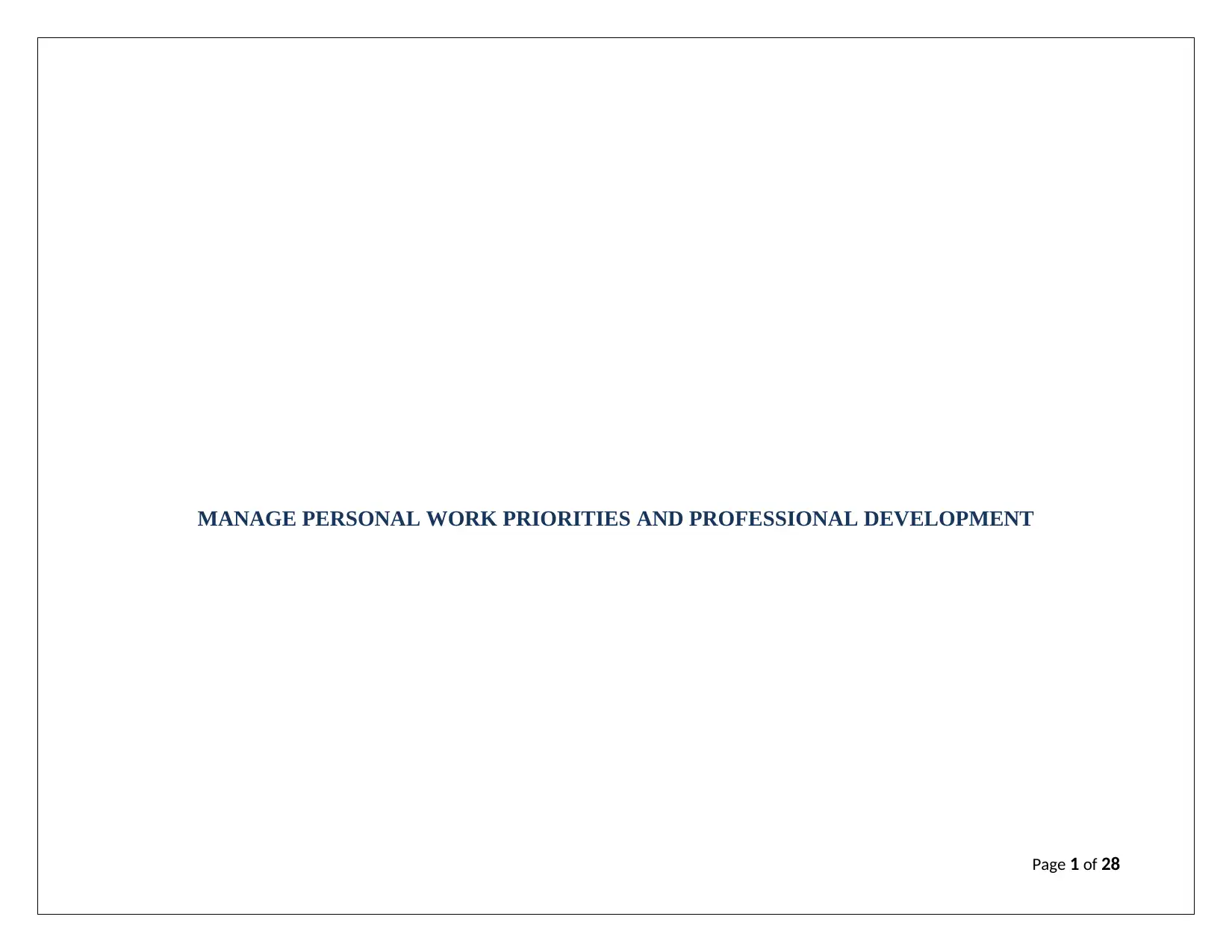
MANAGE PERSONAL WORK PRIORITIES AND PROFESSIONAL DEVELOPMENT
Page 1 of 28
Page 1 of 28
Secure Best Marks with AI Grader
Need help grading? Try our AI Grader for instant feedback on your assignments.
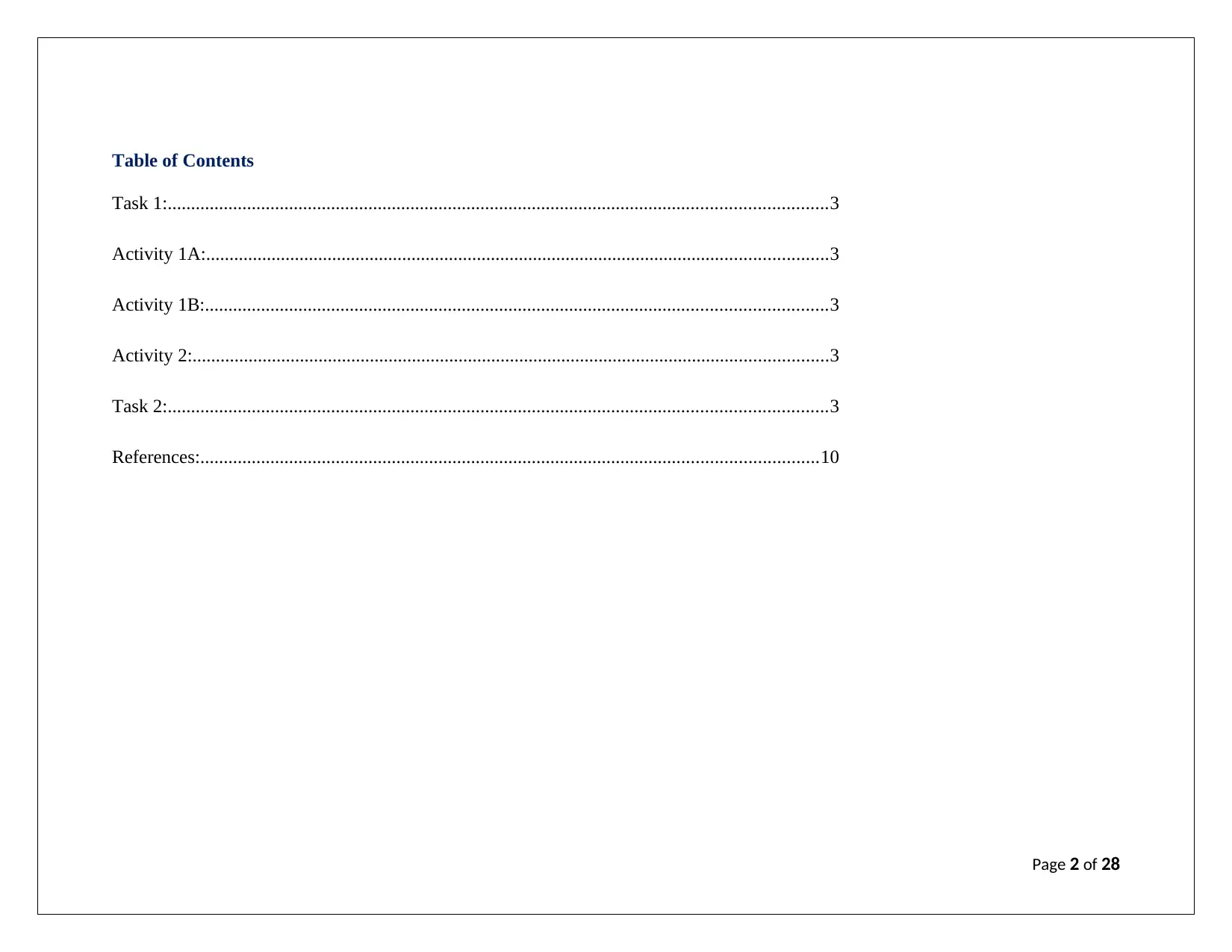
Table of Contents
Task 1:.............................................................................................................................................3
Activity 1A:.....................................................................................................................................3
Activity 1B:.....................................................................................................................................3
Activity 2:........................................................................................................................................3
Task 2:.............................................................................................................................................3
References:....................................................................................................................................10
Page 2 of 28
Task 1:.............................................................................................................................................3
Activity 1A:.....................................................................................................................................3
Activity 1B:.....................................................................................................................................3
Activity 2:........................................................................................................................................3
Task 2:.............................................................................................................................................3
References:....................................................................................................................................10
Page 2 of 28
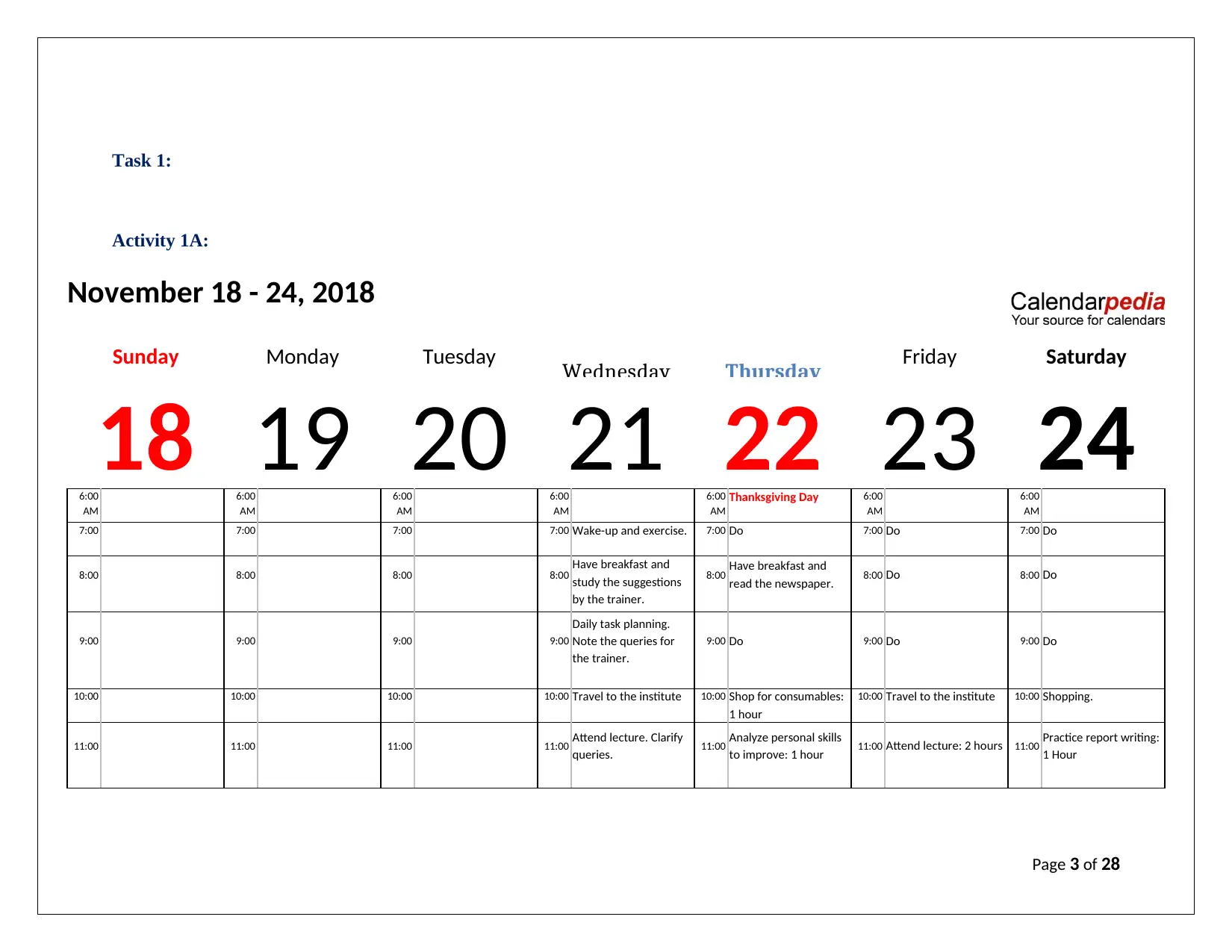
Task 1:
Activity 1A:
November 18 - 24, 2018
Sunday Monday Tuesday Wednesday Thursday Friday Saturday
18 19 20 21 22 23 246:00
AM
6:00
AM
6:00
AM
6:00
AM
6:00
AM
Thanksgiving Day 6:00
AM
6:00
AM
7:00 7:00 7:00 7:00 Wake-up and exercise. 7:00 Do 7:00 Do 7:00 Do
8:00 8:00 8:00 8:00 Have breakfast and
study the suggestions
by the trainer.
8:00 Have breakfast and
read the newspaper. 8:00 Do 8:00 Do
9:00 9:00 9:00 9:00
Daily task planning.
Note the queries for
the trainer.
9:00 Do 9:00 Do 9:00 Do
10:00 10:00 10:00 10:00 Travel to the institute 10:00 Shop for consumables:
1 hour
10:00 Travel to the institute 10:00 Shopping.
11:00 11:00 11:00 11:00 Attend lecture. Clarify
queries. 11:00 Analyze personal skills
to improve: 1 hour 11:00 Attend lecture: 2 hours 11:00 Practice report writing:
1 Hour
Page 3 of 28
Activity 1A:
November 18 - 24, 2018
Sunday Monday Tuesday Wednesday Thursday Friday Saturday
18 19 20 21 22 23 246:00
AM
6:00
AM
6:00
AM
6:00
AM
6:00
AM
Thanksgiving Day 6:00
AM
6:00
AM
7:00 7:00 7:00 7:00 Wake-up and exercise. 7:00 Do 7:00 Do 7:00 Do
8:00 8:00 8:00 8:00 Have breakfast and
study the suggestions
by the trainer.
8:00 Have breakfast and
read the newspaper. 8:00 Do 8:00 Do
9:00 9:00 9:00 9:00
Daily task planning.
Note the queries for
the trainer.
9:00 Do 9:00 Do 9:00 Do
10:00 10:00 10:00 10:00 Travel to the institute 10:00 Shop for consumables:
1 hour
10:00 Travel to the institute 10:00 Shopping.
11:00 11:00 11:00 11:00 Attend lecture. Clarify
queries. 11:00 Analyze personal skills
to improve: 1 hour 11:00 Attend lecture: 2 hours 11:00 Practice report writing:
1 Hour
Page 3 of 28
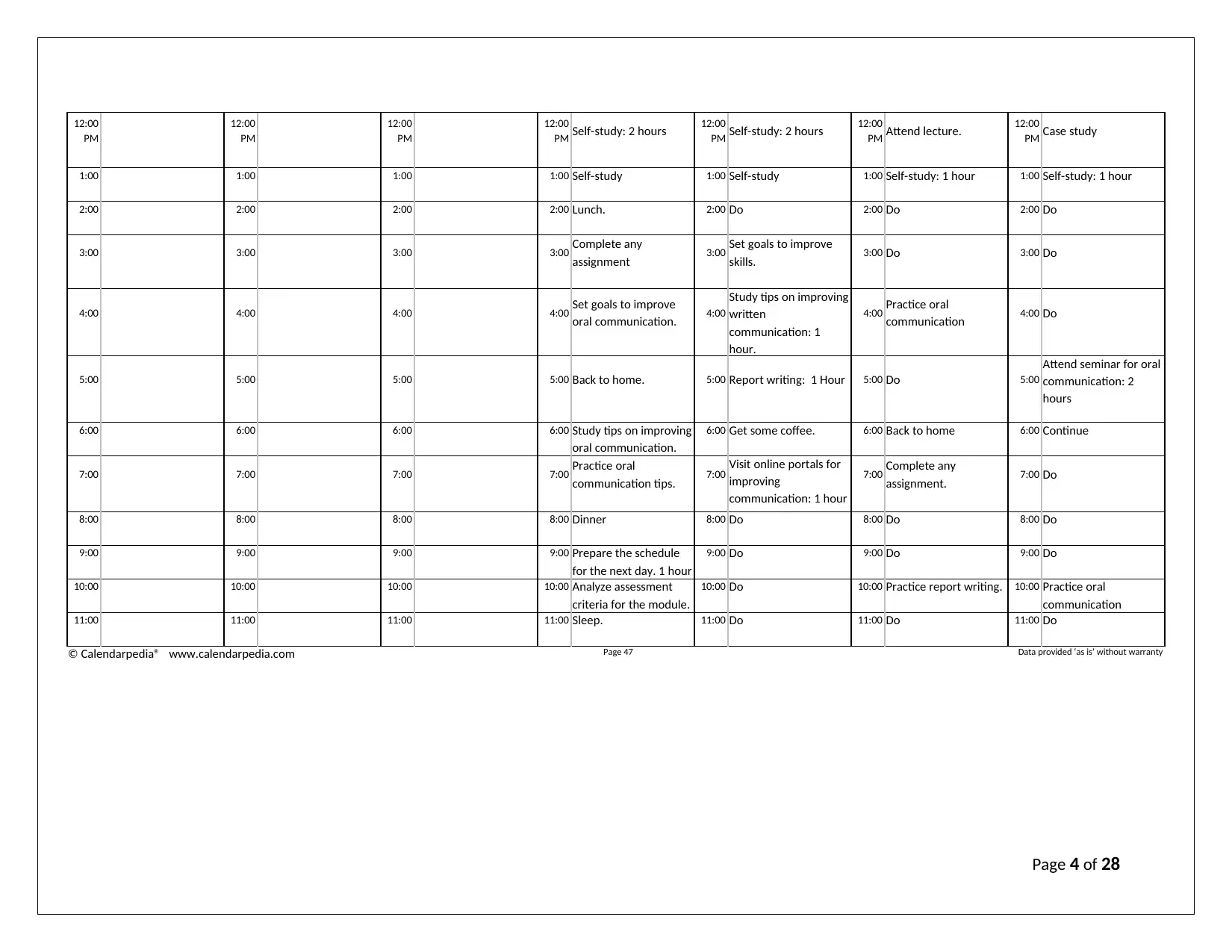
12:00
PM
12:00
PM
12:00
PM
12:00
PM Self-study: 2 hours 12:00
PM Self-study: 2 hours 12:00
PM Attend lecture. 12:00
PM Case study
1:00 1:00 1:00 1:00 Self-study 1:00 Self-study 1:00 Self-study: 1 hour 1:00 Self-study: 1 hour
2:00 2:00 2:00 2:00 Lunch. 2:00 Do 2:00 Do 2:00 Do
3:00 3:00 3:00 3:00 Complete any
assignment 3:00 Set goals to improve
skills. 3:00 Do 3:00 Do
4:00 4:00 4:00 4:00 Set goals to improve
oral communication. 4:00
Study tips on improving
written
communication: 1
hour.
4:00 Practice oral
communication 4:00 Do
5:00 5:00 5:00 5:00 Back to home. 5:00 Report writing: 1 Hour 5:00 Do 5:00
Attend seminar for oral
communication: 2
hours
6:00 6:00 6:00 6:00 Study tips on improving
oral communication.
6:00 Get some coffee. 6:00 Back to home 6:00 Continue
7:00 7:00 7:00 7:00 Practice oral
communication tips. 7:00 Visit online portals for
improving
communication: 1 hour
7:00 Complete any
assignment. 7:00 Do
8:00 8:00 8:00 8:00 Dinner 8:00 Do 8:00 Do 8:00 Do
9:00 9:00 9:00 9:00 Prepare the schedule
for the next day. 1 hour
9:00 Do 9:00 Do 9:00 Do
10:00 10:00 10:00 10:00 Analyze assessment
criteria for the module.
1 hour
10:00 Do 10:00 Practice report writing. 10:00 Practice oral
communication
11:00 11:00 11:00 11:00 Sleep. 11:00 Do 11:00 Do 11:00 Do
© Calendarpedia® www.calendarpedia.com Page 47 Data provided ‘as is’ without warranty
Page 4 of 28
PM
12:00
PM
12:00
PM
12:00
PM Self-study: 2 hours 12:00
PM Self-study: 2 hours 12:00
PM Attend lecture. 12:00
PM Case study
1:00 1:00 1:00 1:00 Self-study 1:00 Self-study 1:00 Self-study: 1 hour 1:00 Self-study: 1 hour
2:00 2:00 2:00 2:00 Lunch. 2:00 Do 2:00 Do 2:00 Do
3:00 3:00 3:00 3:00 Complete any
assignment 3:00 Set goals to improve
skills. 3:00 Do 3:00 Do
4:00 4:00 4:00 4:00 Set goals to improve
oral communication. 4:00
Study tips on improving
written
communication: 1
hour.
4:00 Practice oral
communication 4:00 Do
5:00 5:00 5:00 5:00 Back to home. 5:00 Report writing: 1 Hour 5:00 Do 5:00
Attend seminar for oral
communication: 2
hours
6:00 6:00 6:00 6:00 Study tips on improving
oral communication.
6:00 Get some coffee. 6:00 Back to home 6:00 Continue
7:00 7:00 7:00 7:00 Practice oral
communication tips. 7:00 Visit online portals for
improving
communication: 1 hour
7:00 Complete any
assignment. 7:00 Do
8:00 8:00 8:00 8:00 Dinner 8:00 Do 8:00 Do 8:00 Do
9:00 9:00 9:00 9:00 Prepare the schedule
for the next day. 1 hour
9:00 Do 9:00 Do 9:00 Do
10:00 10:00 10:00 10:00 Analyze assessment
criteria for the module.
1 hour
10:00 Do 10:00 Practice report writing. 10:00 Practice oral
communication
11:00 11:00 11:00 11:00 Sleep. 11:00 Do 11:00 Do 11:00 Do
© Calendarpedia® www.calendarpedia.com Page 47 Data provided ‘as is’ without warranty
Page 4 of 28
Secure Best Marks with AI Grader
Need help grading? Try our AI Grader for instant feedback on your assignments.
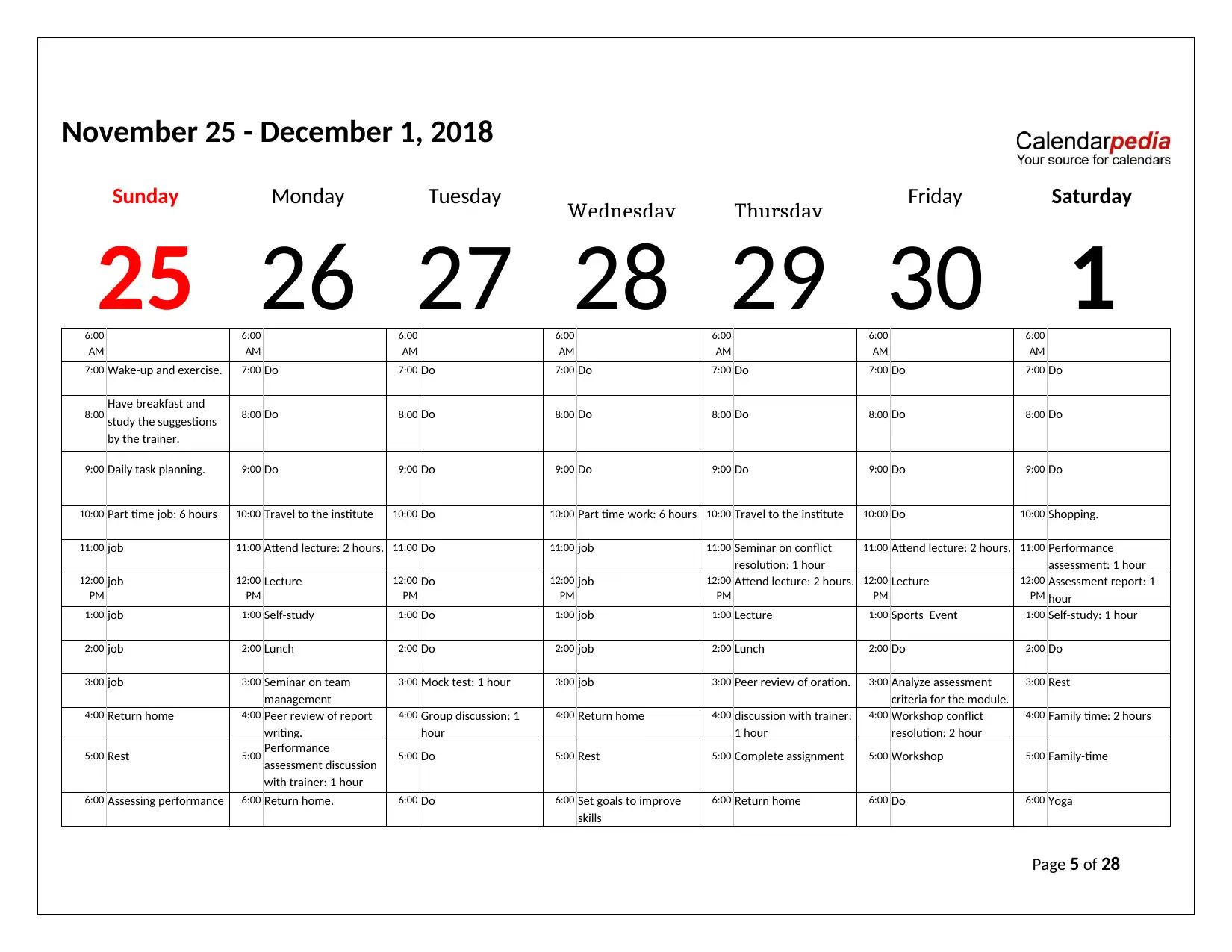
November 25 - December 1, 2018
Sunday Monday Tuesday Wednesday Thursday Friday Saturday
25 26 27 28 29 30 16:00
AM
6:00
AM
6:00
AM
6:00
AM
6:00
AM
6:00
AM
6:00
AM
7:00 Wake-up and exercise. 7:00 Do 7:00 Do 7:00 Do 7:00 Do 7:00 Do 7:00 Do
8:00 Have breakfast and
study the suggestions
by the trainer.
8:00 Do 8:00 Do 8:00 Do 8:00 Do 8:00 Do 8:00 Do
9:00 Daily task planning. 9:00 Do 9:00 Do 9:00 Do 9:00 Do 9:00 Do 9:00 Do
10:00 Part time job: 6 hours 10:00 Travel to the institute 10:00 Do 10:00 Part time work: 6 hours 10:00 Travel to the institute 10:00 Do 10:00 Shopping.
11:00 job 11:00 Attend lecture: 2 hours. 11:00 Do 11:00 job 11:00 Seminar on conflict
resolution: 1 hour
11:00 Attend lecture: 2 hours. 11:00 Performance
assessment: 1 hour
12:00
PM
job 12:00
PM
Lecture 12:00
PM
Do 12:00
PM
job 12:00
PM
Attend lecture: 2 hours. 12:00
PM
Lecture 12:00
PM
Assessment report: 1
hour
1:00 job 1:00 Self-study 1:00 Do 1:00 job 1:00 Lecture 1:00 Sports Event 1:00 Self-study: 1 hour
2:00 job 2:00 Lunch 2:00 Do 2:00 job 2:00 Lunch 2:00 Do 2:00 Do
3:00 job 3:00 Seminar on team
management
3:00 Mock test: 1 hour 3:00 job 3:00 Peer review of oration. 3:00 Analyze assessment
criteria for the module.
3:00 Rest
4:00 Return home 4:00 Peer review of report
writing.
4:00 Group discussion: 1
hour
4:00 Return home 4:00 discussion with trainer:
1 hour
4:00 Workshop conflict
resolution: 2 hour
4:00 Family time: 2 hours
5:00 Rest 5:00 Performance
assessment discussion
with trainer: 1 hour
5:00 Do 5:00 Rest 5:00 Complete assignment 5:00 Workshop 5:00 Family-time
6:00 Assessing performance 6:00 Return home. 6:00 Do 6:00 Set goals to improve
skills
6:00 Return home 6:00 Do 6:00 Yoga
Page 5 of 28
Sunday Monday Tuesday Wednesday Thursday Friday Saturday
25 26 27 28 29 30 16:00
AM
6:00
AM
6:00
AM
6:00
AM
6:00
AM
6:00
AM
6:00
AM
7:00 Wake-up and exercise. 7:00 Do 7:00 Do 7:00 Do 7:00 Do 7:00 Do 7:00 Do
8:00 Have breakfast and
study the suggestions
by the trainer.
8:00 Do 8:00 Do 8:00 Do 8:00 Do 8:00 Do 8:00 Do
9:00 Daily task planning. 9:00 Do 9:00 Do 9:00 Do 9:00 Do 9:00 Do 9:00 Do
10:00 Part time job: 6 hours 10:00 Travel to the institute 10:00 Do 10:00 Part time work: 6 hours 10:00 Travel to the institute 10:00 Do 10:00 Shopping.
11:00 job 11:00 Attend lecture: 2 hours. 11:00 Do 11:00 job 11:00 Seminar on conflict
resolution: 1 hour
11:00 Attend lecture: 2 hours. 11:00 Performance
assessment: 1 hour
12:00
PM
job 12:00
PM
Lecture 12:00
PM
Do 12:00
PM
job 12:00
PM
Attend lecture: 2 hours. 12:00
PM
Lecture 12:00
PM
Assessment report: 1
hour
1:00 job 1:00 Self-study 1:00 Do 1:00 job 1:00 Lecture 1:00 Sports Event 1:00 Self-study: 1 hour
2:00 job 2:00 Lunch 2:00 Do 2:00 job 2:00 Lunch 2:00 Do 2:00 Do
3:00 job 3:00 Seminar on team
management
3:00 Mock test: 1 hour 3:00 job 3:00 Peer review of oration. 3:00 Analyze assessment
criteria for the module.
3:00 Rest
4:00 Return home 4:00 Peer review of report
writing.
4:00 Group discussion: 1
hour
4:00 Return home 4:00 discussion with trainer:
1 hour
4:00 Workshop conflict
resolution: 2 hour
4:00 Family time: 2 hours
5:00 Rest 5:00 Performance
assessment discussion
with trainer: 1 hour
5:00 Do 5:00 Rest 5:00 Complete assignment 5:00 Workshop 5:00 Family-time
6:00 Assessing performance 6:00 Return home. 6:00 Do 6:00 Set goals to improve
skills
6:00 Return home 6:00 Do 6:00 Yoga
Page 5 of 28
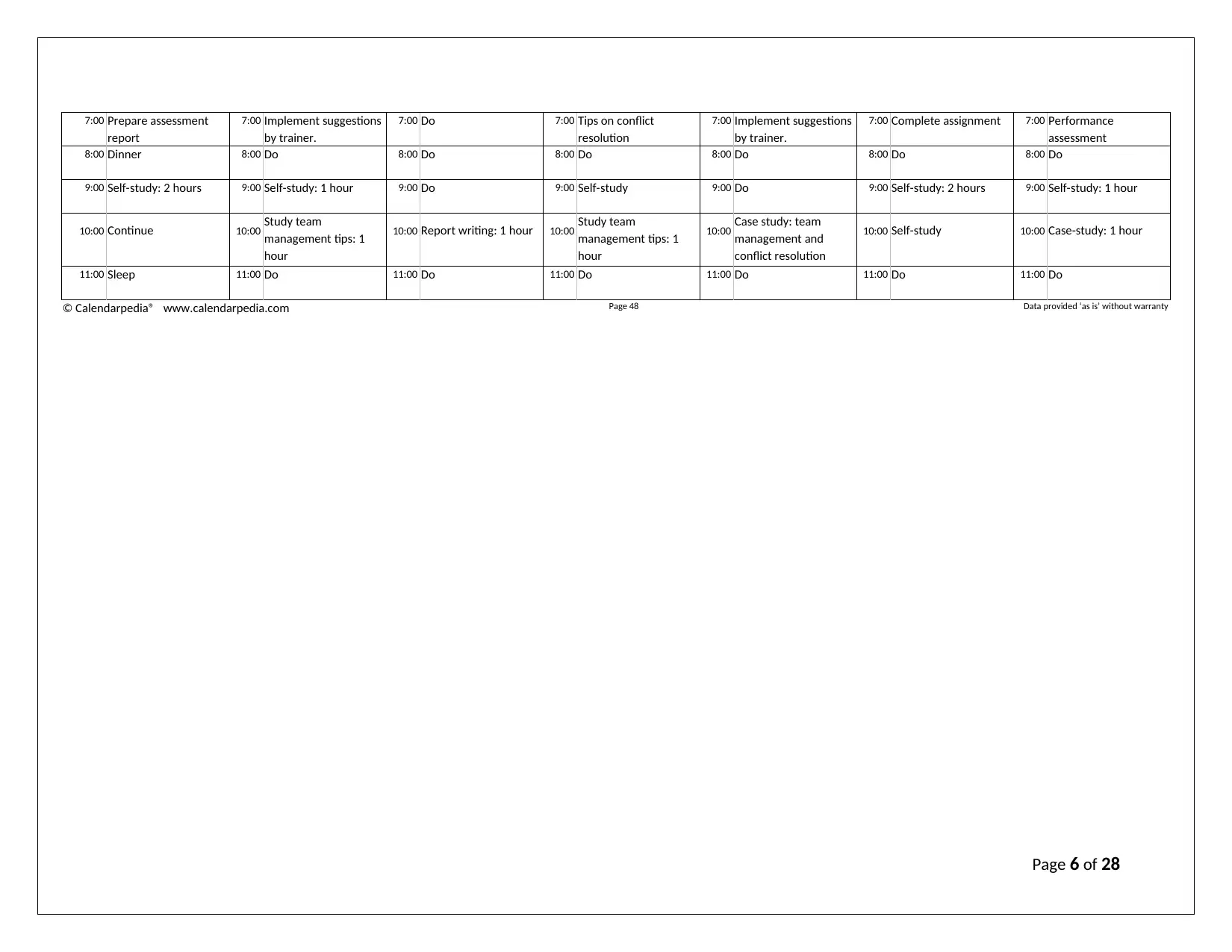
7:00 Prepare assessment
report
7:00 Implement suggestions
by trainer.
7:00 Do 7:00 Tips on conflict
resolution
7:00 Implement suggestions
by trainer.
7:00 Complete assignment 7:00 Performance
assessment
8:00 Dinner 8:00 Do 8:00 Do 8:00 Do 8:00 Do 8:00 Do 8:00 Do
9:00 Self-study: 2 hours 9:00 Self-study: 1 hour 9:00 Do 9:00 Self-study 9:00 Do 9:00 Self-study: 2 hours 9:00 Self-study: 1 hour
10:00 Continue 10:00 Study team
management tips: 1
hour
10:00 Report writing: 1 hour 10:00 Study team
management tips: 1
hour
10:00 Case study: team
management and
conflict resolution
10:00 Self-study 10:00 Case-study: 1 hour
11:00 Sleep 11:00 Do 11:00 Do 11:00 Do 11:00 Do 11:00 Do 11:00 Do
© Calendarpedia® www.calendarpedia.com Page 48 Data provided ‘as is’ without warranty
Page 6 of 28
report
7:00 Implement suggestions
by trainer.
7:00 Do 7:00 Tips on conflict
resolution
7:00 Implement suggestions
by trainer.
7:00 Complete assignment 7:00 Performance
assessment
8:00 Dinner 8:00 Do 8:00 Do 8:00 Do 8:00 Do 8:00 Do 8:00 Do
9:00 Self-study: 2 hours 9:00 Self-study: 1 hour 9:00 Do 9:00 Self-study 9:00 Do 9:00 Self-study: 2 hours 9:00 Self-study: 1 hour
10:00 Continue 10:00 Study team
management tips: 1
hour
10:00 Report writing: 1 hour 10:00 Study team
management tips: 1
hour
10:00 Case study: team
management and
conflict resolution
10:00 Self-study 10:00 Case-study: 1 hour
11:00 Sleep 11:00 Do 11:00 Do 11:00 Do 11:00 Do 11:00 Do 11:00 Do
© Calendarpedia® www.calendarpedia.com Page 48 Data provided ‘as is’ without warranty
Page 6 of 28
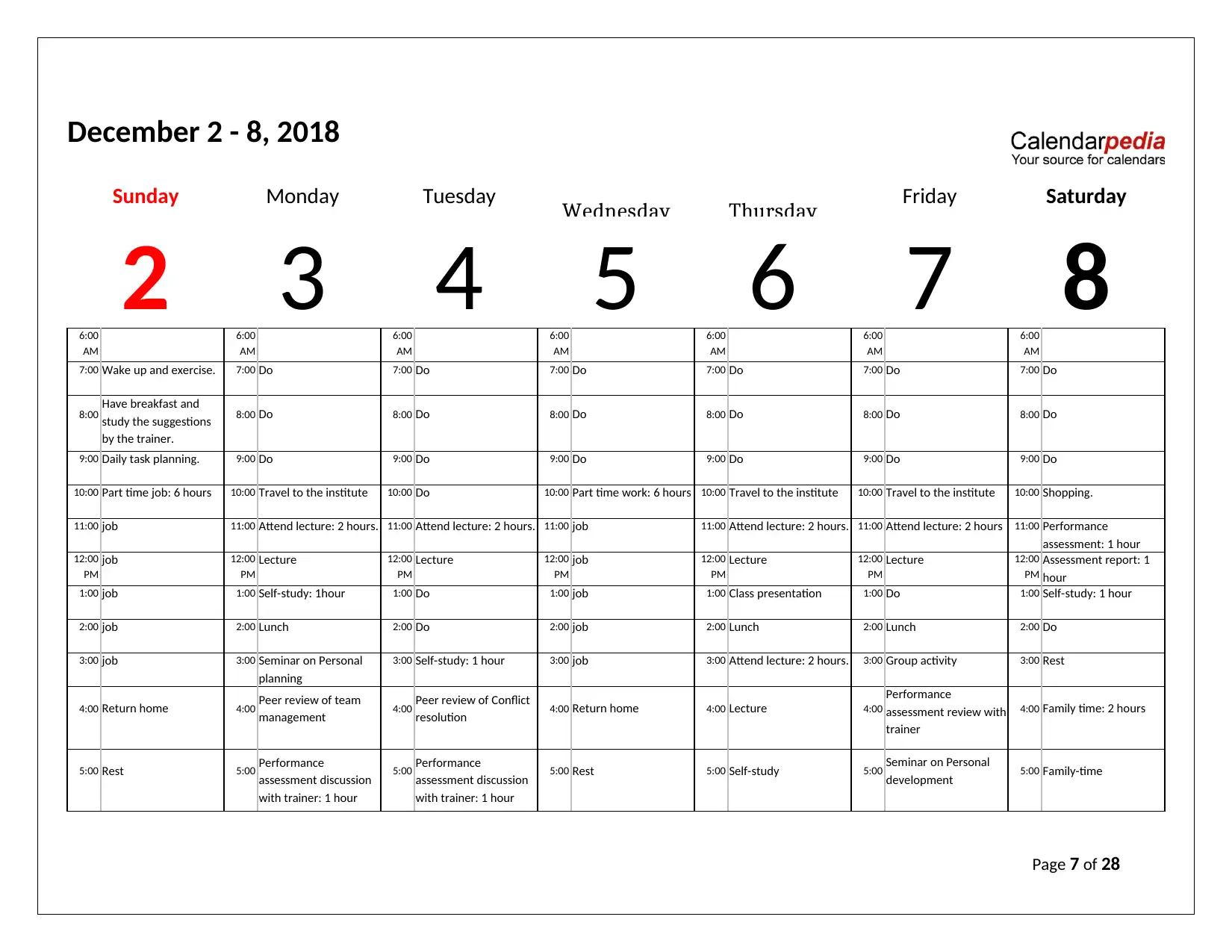
December 2 - 8, 2018
Sunday Monday Tuesday Wednesday Thursday Friday Saturday
2 3 4 5 6 7 86:00
AM
6:00
AM
6:00
AM
6:00
AM
6:00
AM
6:00
AM
6:00
AM
7:00 Wake up and exercise. 7:00 Do 7:00 Do 7:00 Do 7:00 Do 7:00 Do 7:00 Do
8:00 Have breakfast and
study the suggestions
by the trainer.
8:00 Do 8:00 Do 8:00 Do 8:00 Do 8:00 Do 8:00 Do
9:00 Daily task planning. 9:00 Do 9:00 Do 9:00 Do 9:00 Do 9:00 Do 9:00 Do
10:00 Part time job: 6 hours 10:00 Travel to the institute 10:00 Do 10:00 Part time work: 6 hours 10:00 Travel to the institute 10:00 Travel to the institute 10:00 Shopping.
11:00 job 11:00 Attend lecture: 2 hours. 11:00 Attend lecture: 2 hours. 11:00 job 11:00 Attend lecture: 2 hours. 11:00 Attend lecture: 2 hours 11:00 Performance
assessment: 1 hour
12:00
PM
job 12:00
PM
Lecture 12:00
PM
Lecture 12:00
PM
job 12:00
PM
Lecture 12:00
PM
Lecture 12:00
PM
Assessment report: 1
hour
1:00 job 1:00 Self-study: 1hour 1:00 Do 1:00 job 1:00 Class presentation 1:00 Do 1:00 Self-study: 1 hour
2:00 job 2:00 Lunch 2:00 Do 2:00 job 2:00 Lunch 2:00 Lunch 2:00 Do
3:00 job 3:00 Seminar on Personal
planning
3:00 Self-study: 1 hour 3:00 job 3:00 Attend lecture: 2 hours. 3:00 Group activity 3:00 Rest
4:00 Return home 4:00 Peer review of team
management 4:00 Peer review of Conflict
resolution 4:00 Return home 4:00 Lecture 4:00
Performance
assessment review with
trainer
4:00 Family time: 2 hours
5:00 Rest 5:00 Performance
assessment discussion
with trainer: 1 hour
5:00 Performance
assessment discussion
with trainer: 1 hour
5:00 Rest 5:00 Self-study 5:00 Seminar on Personal
development 5:00 Family-time
Page 7 of 28
Sunday Monday Tuesday Wednesday Thursday Friday Saturday
2 3 4 5 6 7 86:00
AM
6:00
AM
6:00
AM
6:00
AM
6:00
AM
6:00
AM
6:00
AM
7:00 Wake up and exercise. 7:00 Do 7:00 Do 7:00 Do 7:00 Do 7:00 Do 7:00 Do
8:00 Have breakfast and
study the suggestions
by the trainer.
8:00 Do 8:00 Do 8:00 Do 8:00 Do 8:00 Do 8:00 Do
9:00 Daily task planning. 9:00 Do 9:00 Do 9:00 Do 9:00 Do 9:00 Do 9:00 Do
10:00 Part time job: 6 hours 10:00 Travel to the institute 10:00 Do 10:00 Part time work: 6 hours 10:00 Travel to the institute 10:00 Travel to the institute 10:00 Shopping.
11:00 job 11:00 Attend lecture: 2 hours. 11:00 Attend lecture: 2 hours. 11:00 job 11:00 Attend lecture: 2 hours. 11:00 Attend lecture: 2 hours 11:00 Performance
assessment: 1 hour
12:00
PM
job 12:00
PM
Lecture 12:00
PM
Lecture 12:00
PM
job 12:00
PM
Lecture 12:00
PM
Lecture 12:00
PM
Assessment report: 1
hour
1:00 job 1:00 Self-study: 1hour 1:00 Do 1:00 job 1:00 Class presentation 1:00 Do 1:00 Self-study: 1 hour
2:00 job 2:00 Lunch 2:00 Do 2:00 job 2:00 Lunch 2:00 Lunch 2:00 Do
3:00 job 3:00 Seminar on Personal
planning
3:00 Self-study: 1 hour 3:00 job 3:00 Attend lecture: 2 hours. 3:00 Group activity 3:00 Rest
4:00 Return home 4:00 Peer review of team
management 4:00 Peer review of Conflict
resolution 4:00 Return home 4:00 Lecture 4:00
Performance
assessment review with
trainer
4:00 Family time: 2 hours
5:00 Rest 5:00 Performance
assessment discussion
with trainer: 1 hour
5:00 Performance
assessment discussion
with trainer: 1 hour
5:00 Rest 5:00 Self-study 5:00 Seminar on Personal
development 5:00 Family-time
Page 7 of 28
Paraphrase This Document
Need a fresh take? Get an instant paraphrase of this document with our AI Paraphraser
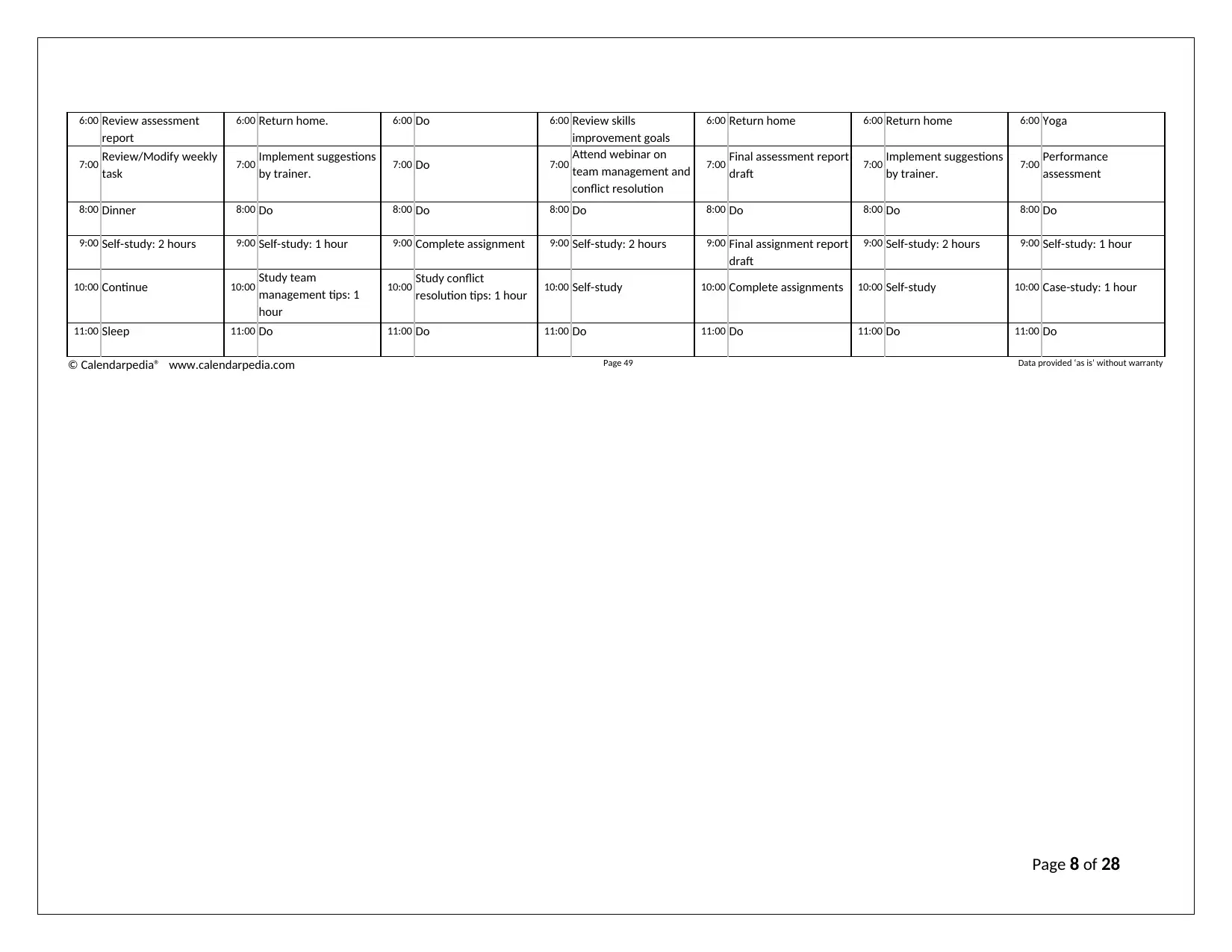
6:00 Review assessment
report
6:00 Return home. 6:00 Do 6:00 Review skills
improvement goals
6:00 Return home 6:00 Return home 6:00 Yoga
7:00 Review/Modify weekly
task 7:00 Implement suggestions
by trainer. 7:00 Do 7:00 Attend webinar on
team management and
conflict resolution
7:00 Final assessment report
draft 7:00 Implement suggestions
by trainer. 7:00 Performance
assessment
8:00 Dinner 8:00 Do 8:00 Do 8:00 Do 8:00 Do 8:00 Do 8:00 Do
9:00 Self-study: 2 hours 9:00 Self-study: 1 hour 9:00 Complete assignment 9:00 Self-study: 2 hours 9:00 Final assignment report
draft
9:00 Self-study: 2 hours 9:00 Self-study: 1 hour
10:00 Continue 10:00 Study team
management tips: 1
hour
10:00 Study conflict
resolution tips: 1 hour 10:00 Self-study 10:00 Complete assignments 10:00 Self-study 10:00 Case-study: 1 hour
11:00 Sleep 11:00 Do 11:00 Do 11:00 Do 11:00 Do 11:00 Do 11:00 Do
© Calendarpedia® www.calendarpedia.com Page 49 Data provided ‘as is’ without warranty
Page 8 of 28
report
6:00 Return home. 6:00 Do 6:00 Review skills
improvement goals
6:00 Return home 6:00 Return home 6:00 Yoga
7:00 Review/Modify weekly
task 7:00 Implement suggestions
by trainer. 7:00 Do 7:00 Attend webinar on
team management and
conflict resolution
7:00 Final assessment report
draft 7:00 Implement suggestions
by trainer. 7:00 Performance
assessment
8:00 Dinner 8:00 Do 8:00 Do 8:00 Do 8:00 Do 8:00 Do 8:00 Do
9:00 Self-study: 2 hours 9:00 Self-study: 1 hour 9:00 Complete assignment 9:00 Self-study: 2 hours 9:00 Final assignment report
draft
9:00 Self-study: 2 hours 9:00 Self-study: 1 hour
10:00 Continue 10:00 Study team
management tips: 1
hour
10:00 Study conflict
resolution tips: 1 hour 10:00 Self-study 10:00 Complete assignments 10:00 Self-study 10:00 Case-study: 1 hour
11:00 Sleep 11:00 Do 11:00 Do 11:00 Do 11:00 Do 11:00 Do 11:00 Do
© Calendarpedia® www.calendarpedia.com Page 49 Data provided ‘as is’ without warranty
Page 8 of 28
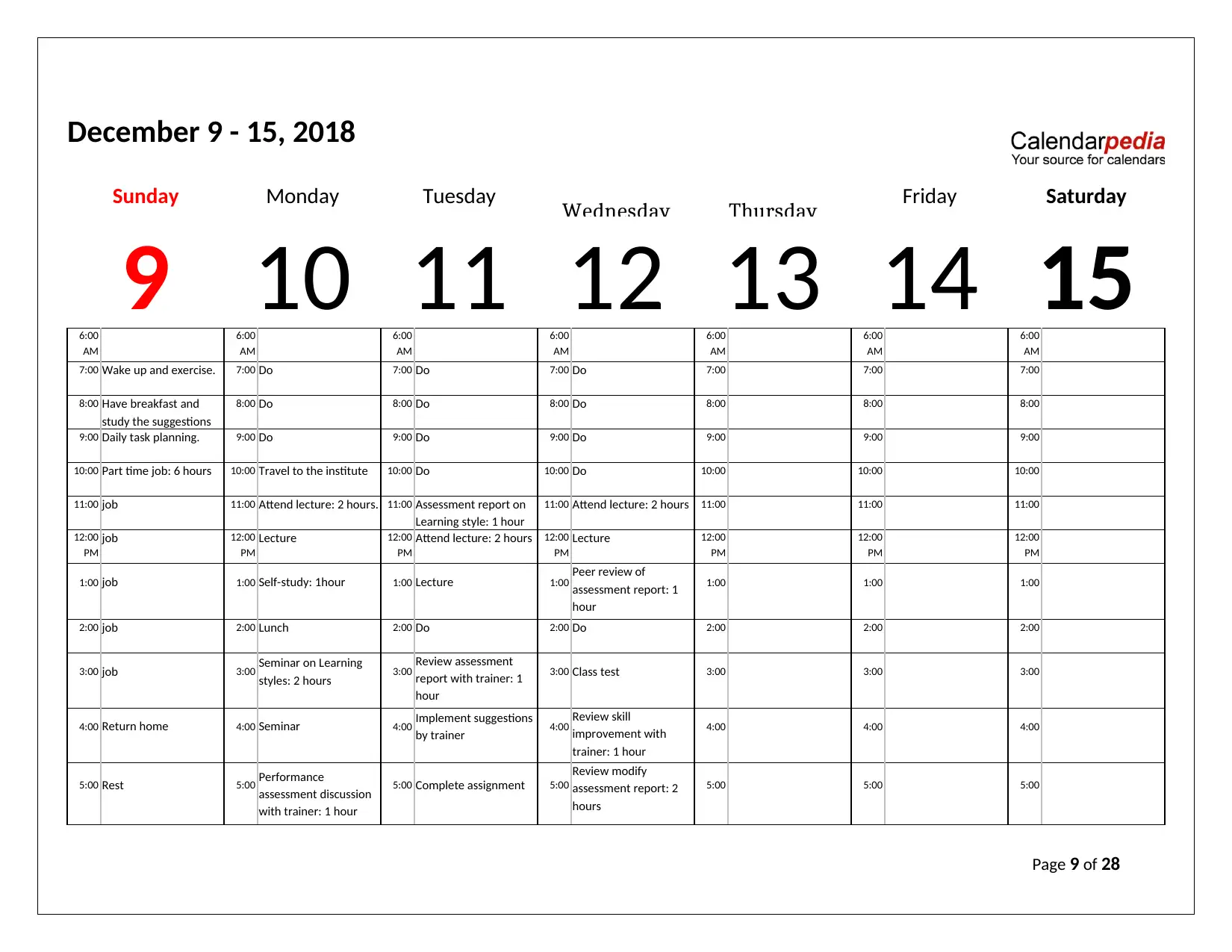
December 9 - 15, 2018
Sunday Monday Tuesday Wednesday Thursday Friday Saturday
9 10 11 12 13 14 156:00
AM
6:00
AM
6:00
AM
6:00
AM
6:00
AM
6:00
AM
6:00
AM
7:00 Wake up and exercise. 7:00 Do 7:00 Do 7:00 Do 7:00 7:00 7:00
8:00 Have breakfast and
study the suggestions
by the trainer.
8:00 Do 8:00 Do 8:00 Do 8:00 8:00 8:00
9:00 Daily task planning. 9:00 Do 9:00 Do 9:00 Do 9:00 9:00 9:00
10:00 Part time job: 6 hours 10:00 Travel to the institute 10:00 Do 10:00 Do 10:00 10:00 10:00
11:00 job 11:00 Attend lecture: 2 hours. 11:00 Assessment report on
Learning style: 1 hour
11:00 Attend lecture: 2 hours 11:00 11:00 11:00
12:00
PM
job 12:00
PM
Lecture 12:00
PM
Attend lecture: 2 hours 12:00
PM
Lecture 12:00
PM
12:00
PM
12:00
PM
1:00 job 1:00 Self-study: 1hour 1:00 Lecture 1:00 Peer review of
assessment report: 1
hour
1:00 1:00 1:00
2:00 job 2:00 Lunch 2:00 Do 2:00 Do 2:00 2:00 2:00
3:00 job 3:00 Seminar on Learning
styles: 2 hours 3:00 Review assessment
report with trainer: 1
hour
3:00 Class test 3:00 3:00 3:00
4:00 Return home 4:00 Seminar 4:00 Implement suggestions
by trainer 4:00 Review skill
improvement with
trainer: 1 hour
4:00 4:00 4:00
5:00 Rest 5:00 Performance
assessment discussion
with trainer: 1 hour
5:00 Complete assignment 5:00
Review modify
assessment report: 2
hours
5:00 5:00 5:00
Page 9 of 28
Sunday Monday Tuesday Wednesday Thursday Friday Saturday
9 10 11 12 13 14 156:00
AM
6:00
AM
6:00
AM
6:00
AM
6:00
AM
6:00
AM
6:00
AM
7:00 Wake up and exercise. 7:00 Do 7:00 Do 7:00 Do 7:00 7:00 7:00
8:00 Have breakfast and
study the suggestions
by the trainer.
8:00 Do 8:00 Do 8:00 Do 8:00 8:00 8:00
9:00 Daily task planning. 9:00 Do 9:00 Do 9:00 Do 9:00 9:00 9:00
10:00 Part time job: 6 hours 10:00 Travel to the institute 10:00 Do 10:00 Do 10:00 10:00 10:00
11:00 job 11:00 Attend lecture: 2 hours. 11:00 Assessment report on
Learning style: 1 hour
11:00 Attend lecture: 2 hours 11:00 11:00 11:00
12:00
PM
job 12:00
PM
Lecture 12:00
PM
Attend lecture: 2 hours 12:00
PM
Lecture 12:00
PM
12:00
PM
12:00
PM
1:00 job 1:00 Self-study: 1hour 1:00 Lecture 1:00 Peer review of
assessment report: 1
hour
1:00 1:00 1:00
2:00 job 2:00 Lunch 2:00 Do 2:00 Do 2:00 2:00 2:00
3:00 job 3:00 Seminar on Learning
styles: 2 hours 3:00 Review assessment
report with trainer: 1
hour
3:00 Class test 3:00 3:00 3:00
4:00 Return home 4:00 Seminar 4:00 Implement suggestions
by trainer 4:00 Review skill
improvement with
trainer: 1 hour
4:00 4:00 4:00
5:00 Rest 5:00 Performance
assessment discussion
with trainer: 1 hour
5:00 Complete assignment 5:00
Review modify
assessment report: 2
hours
5:00 5:00 5:00
Page 9 of 28
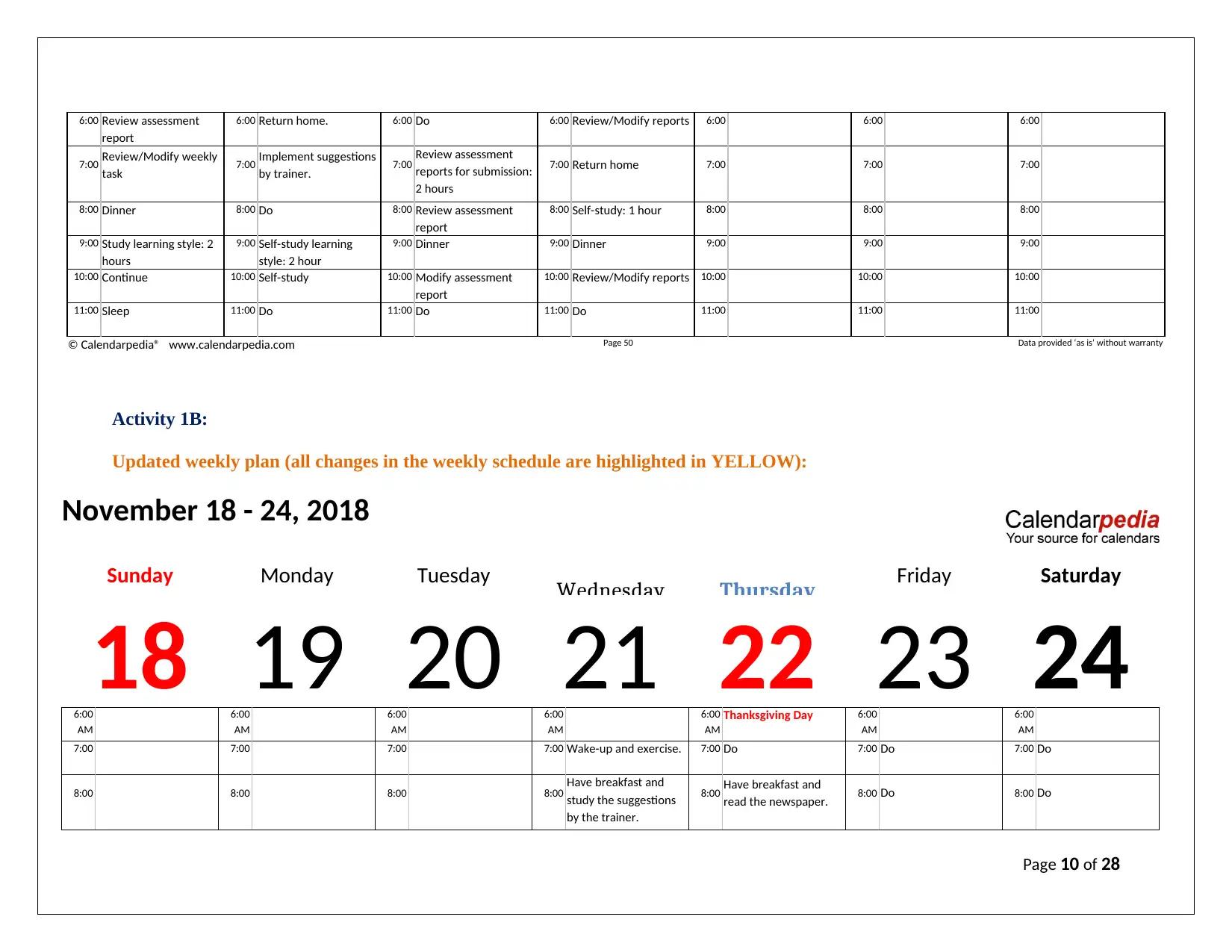
6:00 Review assessment
report
6:00 Return home. 6:00 Do 6:00 Review/Modify reports 6:00 6:00 6:00
7:00 Review/Modify weekly
task 7:00 Implement suggestions
by trainer. 7:00 Review assessment
reports for submission:
2 hours
7:00 Return home 7:00 7:00 7:00
8:00 Dinner 8:00 Do 8:00 Review assessment
report
8:00 Self-study: 1 hour 8:00 8:00 8:00
9:00 Study learning style: 2
hours
9:00 Self-study learning
style: 2 hour
9:00 Dinner 9:00 Dinner 9:00 9:00 9:00
10:00 Continue 10:00 Self-study 10:00 Modify assessment
report
10:00 Review/Modify reports 10:00 10:00 10:00
11:00 Sleep 11:00 Do 11:00 Do 11:00 Do 11:00 11:00 11:00
© Calendarpedia® www.calendarpedia.com Page 50 Data provided ‘as is’ without warranty
Activity 1B:
Updated weekly plan (all changes in the weekly schedule are highlighted in YELLOW):
November 18 - 24, 2018
Sunday Monday Tuesday Wednesday Thursday Friday Saturday
18 19 20 21 22 23 246:00
AM
6:00
AM
6:00
AM
6:00
AM
6:00
AM
Thanksgiving Day 6:00
AM
6:00
AM
7:00 7:00 7:00 7:00 Wake-up and exercise. 7:00 Do 7:00 Do 7:00 Do
8:00 8:00 8:00 8:00 Have breakfast and
study the suggestions
by the trainer.
8:00 Have breakfast and
read the newspaper. 8:00 Do 8:00 Do
Page 10 of 28
report
6:00 Return home. 6:00 Do 6:00 Review/Modify reports 6:00 6:00 6:00
7:00 Review/Modify weekly
task 7:00 Implement suggestions
by trainer. 7:00 Review assessment
reports for submission:
2 hours
7:00 Return home 7:00 7:00 7:00
8:00 Dinner 8:00 Do 8:00 Review assessment
report
8:00 Self-study: 1 hour 8:00 8:00 8:00
9:00 Study learning style: 2
hours
9:00 Self-study learning
style: 2 hour
9:00 Dinner 9:00 Dinner 9:00 9:00 9:00
10:00 Continue 10:00 Self-study 10:00 Modify assessment
report
10:00 Review/Modify reports 10:00 10:00 10:00
11:00 Sleep 11:00 Do 11:00 Do 11:00 Do 11:00 11:00 11:00
© Calendarpedia® www.calendarpedia.com Page 50 Data provided ‘as is’ without warranty
Activity 1B:
Updated weekly plan (all changes in the weekly schedule are highlighted in YELLOW):
November 18 - 24, 2018
Sunday Monday Tuesday Wednesday Thursday Friday Saturday
18 19 20 21 22 23 246:00
AM
6:00
AM
6:00
AM
6:00
AM
6:00
AM
Thanksgiving Day 6:00
AM
6:00
AM
7:00 7:00 7:00 7:00 Wake-up and exercise. 7:00 Do 7:00 Do 7:00 Do
8:00 8:00 8:00 8:00 Have breakfast and
study the suggestions
by the trainer.
8:00 Have breakfast and
read the newspaper. 8:00 Do 8:00 Do
Page 10 of 28
Secure Best Marks with AI Grader
Need help grading? Try our AI Grader for instant feedback on your assignments.
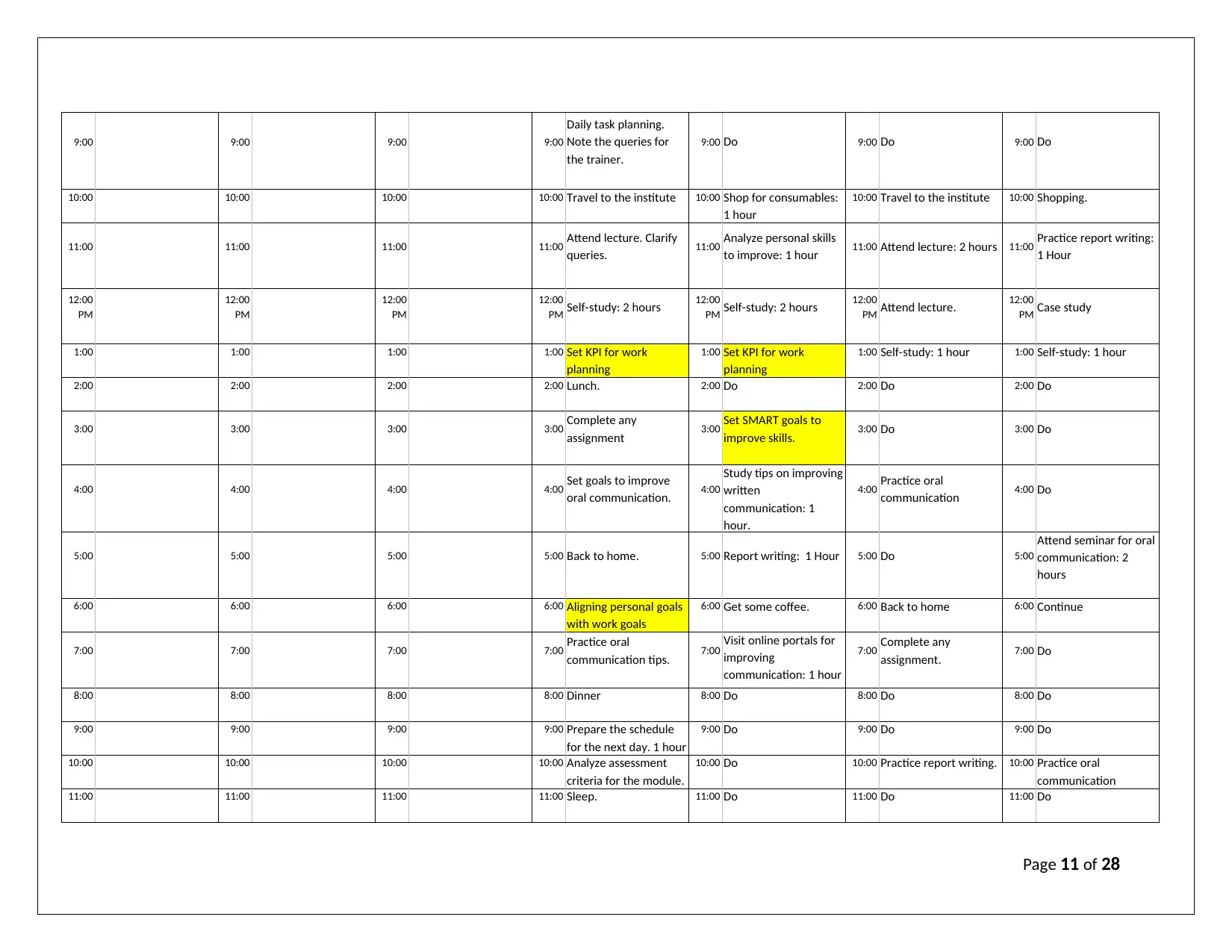
9:00 9:00 9:00 9:00
Daily task planning.
Note the queries for
the trainer.
9:00 Do 9:00 Do 9:00 Do
10:00 10:00 10:00 10:00 Travel to the institute 10:00 Shop for consumables:
1 hour
10:00 Travel to the institute 10:00 Shopping.
11:00 11:00 11:00 11:00 Attend lecture. Clarify
queries. 11:00 Analyze personal skills
to improve: 1 hour 11:00 Attend lecture: 2 hours 11:00 Practice report writing:
1 Hour
12:00
PM
12:00
PM
12:00
PM
12:00
PM Self-study: 2 hours 12:00
PM Self-study: 2 hours 12:00
PM Attend lecture. 12:00
PM Case study
1:00 1:00 1:00 1:00 Set KPI for work
planning
1:00 Set KPI for work
planning
1:00 Self-study: 1 hour 1:00 Self-study: 1 hour
2:00 2:00 2:00 2:00 Lunch. 2:00 Do 2:00 Do 2:00 Do
3:00 3:00 3:00 3:00 Complete any
assignment 3:00 Set SMART goals to
improve skills. 3:00 Do 3:00 Do
4:00 4:00 4:00 4:00 Set goals to improve
oral communication. 4:00
Study tips on improving
written
communication: 1
hour.
4:00 Practice oral
communication 4:00 Do
5:00 5:00 5:00 5:00 Back to home. 5:00 Report writing: 1 Hour 5:00 Do 5:00
Attend seminar for oral
communication: 2
hours
6:00 6:00 6:00 6:00 Aligning personal goals
with work goals
6:00 Get some coffee. 6:00 Back to home 6:00 Continue
7:00 7:00 7:00 7:00 Practice oral
communication tips. 7:00 Visit online portals for
improving
communication: 1 hour
7:00 Complete any
assignment. 7:00 Do
8:00 8:00 8:00 8:00 Dinner 8:00 Do 8:00 Do 8:00 Do
9:00 9:00 9:00 9:00 Prepare the schedule
for the next day. 1 hour
9:00 Do 9:00 Do 9:00 Do
10:00 10:00 10:00 10:00 Analyze assessment
criteria for the module.
1 hour
10:00 Do 10:00 Practice report writing. 10:00 Practice oral
communication
11:00 11:00 11:00 11:00 Sleep. 11:00 Do 11:00 Do 11:00 Do
Page 11 of 28
Daily task planning.
Note the queries for
the trainer.
9:00 Do 9:00 Do 9:00 Do
10:00 10:00 10:00 10:00 Travel to the institute 10:00 Shop for consumables:
1 hour
10:00 Travel to the institute 10:00 Shopping.
11:00 11:00 11:00 11:00 Attend lecture. Clarify
queries. 11:00 Analyze personal skills
to improve: 1 hour 11:00 Attend lecture: 2 hours 11:00 Practice report writing:
1 Hour
12:00
PM
12:00
PM
12:00
PM
12:00
PM Self-study: 2 hours 12:00
PM Self-study: 2 hours 12:00
PM Attend lecture. 12:00
PM Case study
1:00 1:00 1:00 1:00 Set KPI for work
planning
1:00 Set KPI for work
planning
1:00 Self-study: 1 hour 1:00 Self-study: 1 hour
2:00 2:00 2:00 2:00 Lunch. 2:00 Do 2:00 Do 2:00 Do
3:00 3:00 3:00 3:00 Complete any
assignment 3:00 Set SMART goals to
improve skills. 3:00 Do 3:00 Do
4:00 4:00 4:00 4:00 Set goals to improve
oral communication. 4:00
Study tips on improving
written
communication: 1
hour.
4:00 Practice oral
communication 4:00 Do
5:00 5:00 5:00 5:00 Back to home. 5:00 Report writing: 1 Hour 5:00 Do 5:00
Attend seminar for oral
communication: 2
hours
6:00 6:00 6:00 6:00 Aligning personal goals
with work goals
6:00 Get some coffee. 6:00 Back to home 6:00 Continue
7:00 7:00 7:00 7:00 Practice oral
communication tips. 7:00 Visit online portals for
improving
communication: 1 hour
7:00 Complete any
assignment. 7:00 Do
8:00 8:00 8:00 8:00 Dinner 8:00 Do 8:00 Do 8:00 Do
9:00 9:00 9:00 9:00 Prepare the schedule
for the next day. 1 hour
9:00 Do 9:00 Do 9:00 Do
10:00 10:00 10:00 10:00 Analyze assessment
criteria for the module.
1 hour
10:00 Do 10:00 Practice report writing. 10:00 Practice oral
communication
11:00 11:00 11:00 11:00 Sleep. 11:00 Do 11:00 Do 11:00 Do
Page 11 of 28
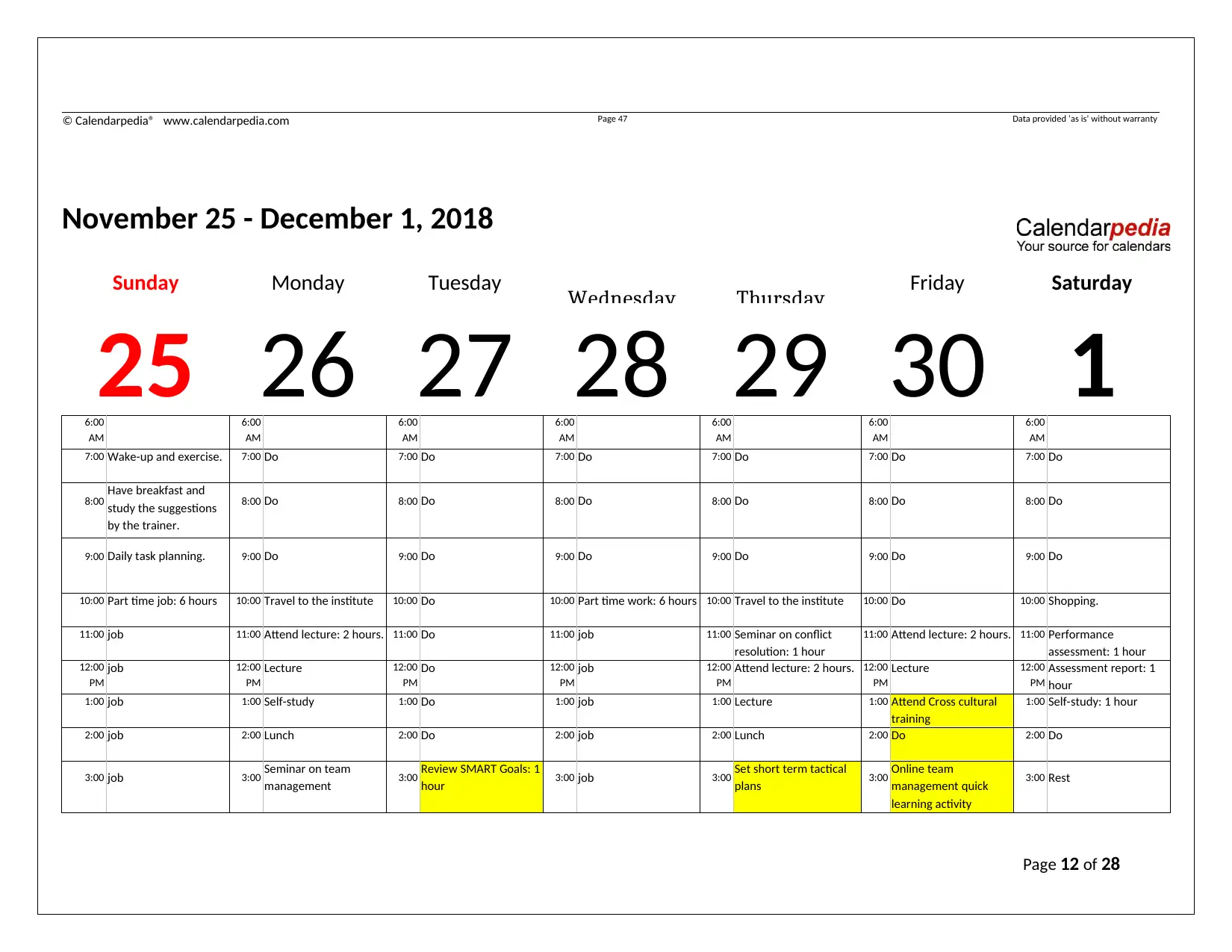
© Calendarpedia® www.calendarpedia.com Page 47 Data provided ‘as is’ without warranty
November 25 - December 1, 2018
Sunday Monday Tuesday Wednesday Thursday Friday Saturday
25 26 27 28 29 30 16:00
AM
6:00
AM
6:00
AM
6:00
AM
6:00
AM
6:00
AM
6:00
AM
7:00 Wake-up and exercise. 7:00 Do 7:00 Do 7:00 Do 7:00 Do 7:00 Do 7:00 Do
8:00 Have breakfast and
study the suggestions
by the trainer.
8:00 Do 8:00 Do 8:00 Do 8:00 Do 8:00 Do 8:00 Do
9:00 Daily task planning. 9:00 Do 9:00 Do 9:00 Do 9:00 Do 9:00 Do 9:00 Do
10:00 Part time job: 6 hours 10:00 Travel to the institute 10:00 Do 10:00 Part time work: 6 hours 10:00 Travel to the institute 10:00 Do 10:00 Shopping.
11:00 job 11:00 Attend lecture: 2 hours. 11:00 Do 11:00 job 11:00 Seminar on conflict
resolution: 1 hour
11:00 Attend lecture: 2 hours. 11:00 Performance
assessment: 1 hour
12:00
PM
job 12:00
PM
Lecture 12:00
PM
Do 12:00
PM
job 12:00
PM
Attend lecture: 2 hours. 12:00
PM
Lecture 12:00
PM
Assessment report: 1
hour
1:00 job 1:00 Self-study 1:00 Do 1:00 job 1:00 Lecture 1:00 Attend Cross cultural
training
1:00 Self-study: 1 hour
2:00 job 2:00 Lunch 2:00 Do 2:00 job 2:00 Lunch 2:00 Do 2:00 Do
3:00 job 3:00 Seminar on team
management 3:00 Review SMART Goals: 1
hour 3:00 job 3:00 Set short term tactical
plans 3:00 Online team
management quick
learning activity
3:00 Rest
Page 12 of 28
November 25 - December 1, 2018
Sunday Monday Tuesday Wednesday Thursday Friday Saturday
25 26 27 28 29 30 16:00
AM
6:00
AM
6:00
AM
6:00
AM
6:00
AM
6:00
AM
6:00
AM
7:00 Wake-up and exercise. 7:00 Do 7:00 Do 7:00 Do 7:00 Do 7:00 Do 7:00 Do
8:00 Have breakfast and
study the suggestions
by the trainer.
8:00 Do 8:00 Do 8:00 Do 8:00 Do 8:00 Do 8:00 Do
9:00 Daily task planning. 9:00 Do 9:00 Do 9:00 Do 9:00 Do 9:00 Do 9:00 Do
10:00 Part time job: 6 hours 10:00 Travel to the institute 10:00 Do 10:00 Part time work: 6 hours 10:00 Travel to the institute 10:00 Do 10:00 Shopping.
11:00 job 11:00 Attend lecture: 2 hours. 11:00 Do 11:00 job 11:00 Seminar on conflict
resolution: 1 hour
11:00 Attend lecture: 2 hours. 11:00 Performance
assessment: 1 hour
12:00
PM
job 12:00
PM
Lecture 12:00
PM
Do 12:00
PM
job 12:00
PM
Attend lecture: 2 hours. 12:00
PM
Lecture 12:00
PM
Assessment report: 1
hour
1:00 job 1:00 Self-study 1:00 Do 1:00 job 1:00 Lecture 1:00 Attend Cross cultural
training
1:00 Self-study: 1 hour
2:00 job 2:00 Lunch 2:00 Do 2:00 job 2:00 Lunch 2:00 Do 2:00 Do
3:00 job 3:00 Seminar on team
management 3:00 Review SMART Goals: 1
hour 3:00 job 3:00 Set short term tactical
plans 3:00 Online team
management quick
learning activity
3:00 Rest
Page 12 of 28
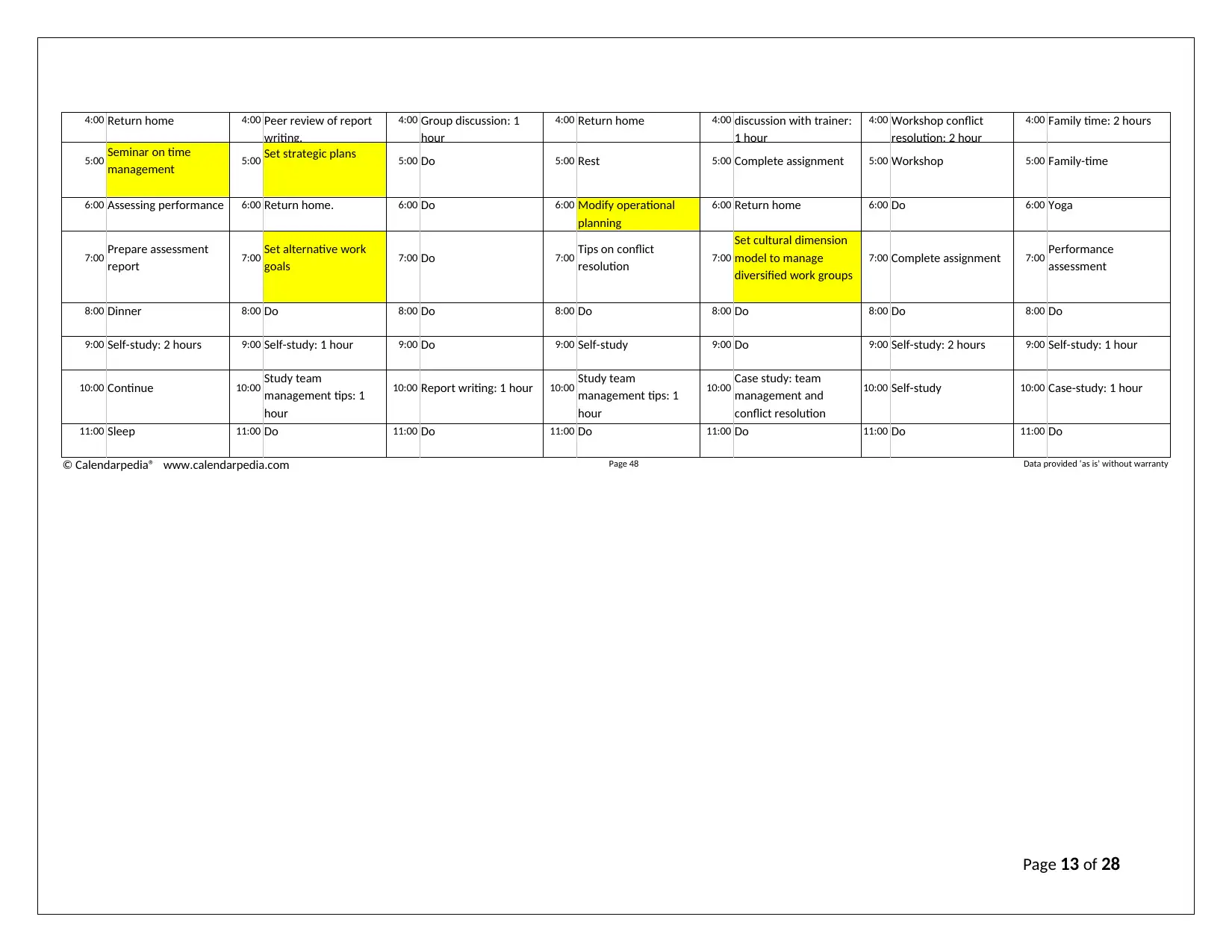
4:00 Return home 4:00 Peer review of report
writing.
4:00 Group discussion: 1
hour
4:00 Return home 4:00 discussion with trainer:
1 hour
4:00 Workshop conflict
resolution: 2 hour
4:00 Family time: 2 hours
5:00 Seminar on time
management 5:00 Set strategic plans 5:00 Do 5:00 Rest 5:00 Complete assignment 5:00 Workshop 5:00 Family-time
6:00 Assessing performance 6:00 Return home. 6:00 Do 6:00 Modify operational
planning
6:00 Return home 6:00 Do 6:00 Yoga
7:00 Prepare assessment
report 7:00 Set alternative work
goals 7:00 Do 7:00 Tips on conflict
resolution 7:00
Set cultural dimension
model to manage
diversified work groups
7:00 Complete assignment 7:00 Performance
assessment
8:00 Dinner 8:00 Do 8:00 Do 8:00 Do 8:00 Do 8:00 Do 8:00 Do
9:00 Self-study: 2 hours 9:00 Self-study: 1 hour 9:00 Do 9:00 Self-study 9:00 Do 9:00 Self-study: 2 hours 9:00 Self-study: 1 hour
10:00 Continue 10:00 Study team
management tips: 1
hour
10:00 Report writing: 1 hour 10:00 Study team
management tips: 1
hour
10:00 Case study: team
management and
conflict resolution
10:00 Self-study 10:00 Case-study: 1 hour
11:00 Sleep 11:00 Do 11:00 Do 11:00 Do 11:00 Do 11:00 Do 11:00 Do
© Calendarpedia® www.calendarpedia.com Page 48 Data provided ‘as is’ without warranty
Page 13 of 28
writing.
4:00 Group discussion: 1
hour
4:00 Return home 4:00 discussion with trainer:
1 hour
4:00 Workshop conflict
resolution: 2 hour
4:00 Family time: 2 hours
5:00 Seminar on time
management 5:00 Set strategic plans 5:00 Do 5:00 Rest 5:00 Complete assignment 5:00 Workshop 5:00 Family-time
6:00 Assessing performance 6:00 Return home. 6:00 Do 6:00 Modify operational
planning
6:00 Return home 6:00 Do 6:00 Yoga
7:00 Prepare assessment
report 7:00 Set alternative work
goals 7:00 Do 7:00 Tips on conflict
resolution 7:00
Set cultural dimension
model to manage
diversified work groups
7:00 Complete assignment 7:00 Performance
assessment
8:00 Dinner 8:00 Do 8:00 Do 8:00 Do 8:00 Do 8:00 Do 8:00 Do
9:00 Self-study: 2 hours 9:00 Self-study: 1 hour 9:00 Do 9:00 Self-study 9:00 Do 9:00 Self-study: 2 hours 9:00 Self-study: 1 hour
10:00 Continue 10:00 Study team
management tips: 1
hour
10:00 Report writing: 1 hour 10:00 Study team
management tips: 1
hour
10:00 Case study: team
management and
conflict resolution
10:00 Self-study 10:00 Case-study: 1 hour
11:00 Sleep 11:00 Do 11:00 Do 11:00 Do 11:00 Do 11:00 Do 11:00 Do
© Calendarpedia® www.calendarpedia.com Page 48 Data provided ‘as is’ without warranty
Page 13 of 28
Paraphrase This Document
Need a fresh take? Get an instant paraphrase of this document with our AI Paraphraser
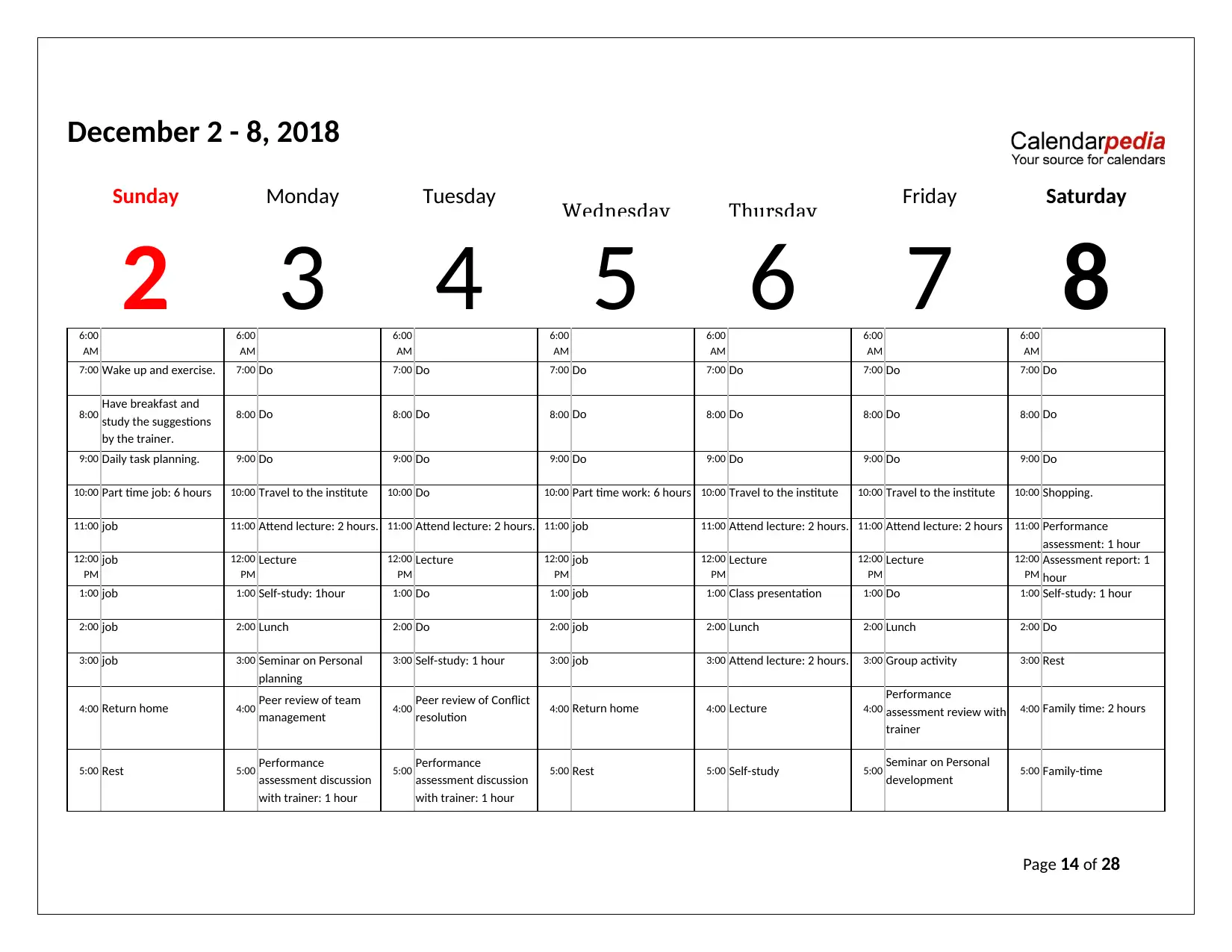
December 2 - 8, 2018
Sunday Monday Tuesday Wednesday Thursday Friday Saturday
2 3 4 5 6 7 86:00
AM
6:00
AM
6:00
AM
6:00
AM
6:00
AM
6:00
AM
6:00
AM
7:00 Wake up and exercise. 7:00 Do 7:00 Do 7:00 Do 7:00 Do 7:00 Do 7:00 Do
8:00 Have breakfast and
study the suggestions
by the trainer.
8:00 Do 8:00 Do 8:00 Do 8:00 Do 8:00 Do 8:00 Do
9:00 Daily task planning. 9:00 Do 9:00 Do 9:00 Do 9:00 Do 9:00 Do 9:00 Do
10:00 Part time job: 6 hours 10:00 Travel to the institute 10:00 Do 10:00 Part time work: 6 hours 10:00 Travel to the institute 10:00 Travel to the institute 10:00 Shopping.
11:00 job 11:00 Attend lecture: 2 hours. 11:00 Attend lecture: 2 hours. 11:00 job 11:00 Attend lecture: 2 hours. 11:00 Attend lecture: 2 hours 11:00 Performance
assessment: 1 hour
12:00
PM
job 12:00
PM
Lecture 12:00
PM
Lecture 12:00
PM
job 12:00
PM
Lecture 12:00
PM
Lecture 12:00
PM
Assessment report: 1
hour
1:00 job 1:00 Self-study: 1hour 1:00 Do 1:00 job 1:00 Class presentation 1:00 Do 1:00 Self-study: 1 hour
2:00 job 2:00 Lunch 2:00 Do 2:00 job 2:00 Lunch 2:00 Lunch 2:00 Do
3:00 job 3:00 Seminar on Personal
planning
3:00 Self-study: 1 hour 3:00 job 3:00 Attend lecture: 2 hours. 3:00 Group activity 3:00 Rest
4:00 Return home 4:00 Peer review of team
management 4:00 Peer review of Conflict
resolution 4:00 Return home 4:00 Lecture 4:00
Performance
assessment review with
trainer
4:00 Family time: 2 hours
5:00 Rest 5:00 Performance
assessment discussion
with trainer: 1 hour
5:00 Performance
assessment discussion
with trainer: 1 hour
5:00 Rest 5:00 Self-study 5:00 Seminar on Personal
development 5:00 Family-time
Page 14 of 28
Sunday Monday Tuesday Wednesday Thursday Friday Saturday
2 3 4 5 6 7 86:00
AM
6:00
AM
6:00
AM
6:00
AM
6:00
AM
6:00
AM
6:00
AM
7:00 Wake up and exercise. 7:00 Do 7:00 Do 7:00 Do 7:00 Do 7:00 Do 7:00 Do
8:00 Have breakfast and
study the suggestions
by the trainer.
8:00 Do 8:00 Do 8:00 Do 8:00 Do 8:00 Do 8:00 Do
9:00 Daily task planning. 9:00 Do 9:00 Do 9:00 Do 9:00 Do 9:00 Do 9:00 Do
10:00 Part time job: 6 hours 10:00 Travel to the institute 10:00 Do 10:00 Part time work: 6 hours 10:00 Travel to the institute 10:00 Travel to the institute 10:00 Shopping.
11:00 job 11:00 Attend lecture: 2 hours. 11:00 Attend lecture: 2 hours. 11:00 job 11:00 Attend lecture: 2 hours. 11:00 Attend lecture: 2 hours 11:00 Performance
assessment: 1 hour
12:00
PM
job 12:00
PM
Lecture 12:00
PM
Lecture 12:00
PM
job 12:00
PM
Lecture 12:00
PM
Lecture 12:00
PM
Assessment report: 1
hour
1:00 job 1:00 Self-study: 1hour 1:00 Do 1:00 job 1:00 Class presentation 1:00 Do 1:00 Self-study: 1 hour
2:00 job 2:00 Lunch 2:00 Do 2:00 job 2:00 Lunch 2:00 Lunch 2:00 Do
3:00 job 3:00 Seminar on Personal
planning
3:00 Self-study: 1 hour 3:00 job 3:00 Attend lecture: 2 hours. 3:00 Group activity 3:00 Rest
4:00 Return home 4:00 Peer review of team
management 4:00 Peer review of Conflict
resolution 4:00 Return home 4:00 Lecture 4:00
Performance
assessment review with
trainer
4:00 Family time: 2 hours
5:00 Rest 5:00 Performance
assessment discussion
with trainer: 1 hour
5:00 Performance
assessment discussion
with trainer: 1 hour
5:00 Rest 5:00 Self-study 5:00 Seminar on Personal
development 5:00 Family-time
Page 14 of 28
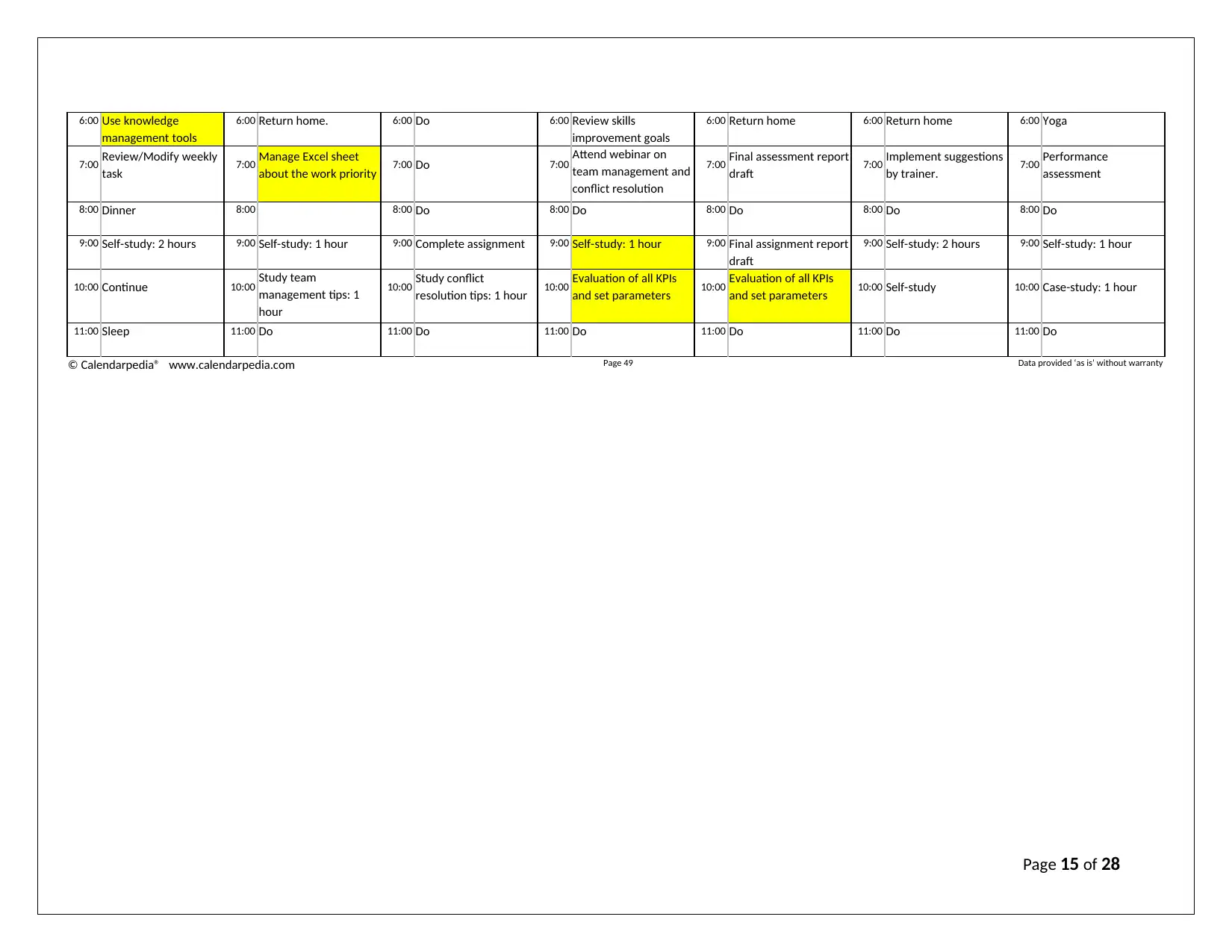
6:00 Use knowledge
management tools
6:00 Return home. 6:00 Do 6:00 Review skills
improvement goals
6:00 Return home 6:00 Return home 6:00 Yoga
7:00 Review/Modify weekly
task 7:00 Manage Excel sheet
about the work priority 7:00 Do 7:00 Attend webinar on
team management and
conflict resolution
7:00 Final assessment report
draft 7:00 Implement suggestions
by trainer. 7:00 Performance
assessment
8:00 Dinner 8:00 8:00 Do 8:00 Do 8:00 Do 8:00 Do 8:00 Do
9:00 Self-study: 2 hours 9:00 Self-study: 1 hour 9:00 Complete assignment 9:00 Self-study: 1 hour 9:00 Final assignment report
draft
9:00 Self-study: 2 hours 9:00 Self-study: 1 hour
10:00 Continue 10:00 Study team
management tips: 1
hour
10:00 Study conflict
resolution tips: 1 hour 10:00 Evaluation of all KPIs
and set parameters 10:00 Evaluation of all KPIs
and set parameters 10:00 Self-study 10:00 Case-study: 1 hour
11:00 Sleep 11:00 Do 11:00 Do 11:00 Do 11:00 Do 11:00 Do 11:00 Do
© Calendarpedia® www.calendarpedia.com Page 49 Data provided ‘as is’ without warranty
Page 15 of 28
management tools
6:00 Return home. 6:00 Do 6:00 Review skills
improvement goals
6:00 Return home 6:00 Return home 6:00 Yoga
7:00 Review/Modify weekly
task 7:00 Manage Excel sheet
about the work priority 7:00 Do 7:00 Attend webinar on
team management and
conflict resolution
7:00 Final assessment report
draft 7:00 Implement suggestions
by trainer. 7:00 Performance
assessment
8:00 Dinner 8:00 8:00 Do 8:00 Do 8:00 Do 8:00 Do 8:00 Do
9:00 Self-study: 2 hours 9:00 Self-study: 1 hour 9:00 Complete assignment 9:00 Self-study: 1 hour 9:00 Final assignment report
draft
9:00 Self-study: 2 hours 9:00 Self-study: 1 hour
10:00 Continue 10:00 Study team
management tips: 1
hour
10:00 Study conflict
resolution tips: 1 hour 10:00 Evaluation of all KPIs
and set parameters 10:00 Evaluation of all KPIs
and set parameters 10:00 Self-study 10:00 Case-study: 1 hour
11:00 Sleep 11:00 Do 11:00 Do 11:00 Do 11:00 Do 11:00 Do 11:00 Do
© Calendarpedia® www.calendarpedia.com Page 49 Data provided ‘as is’ without warranty
Page 15 of 28
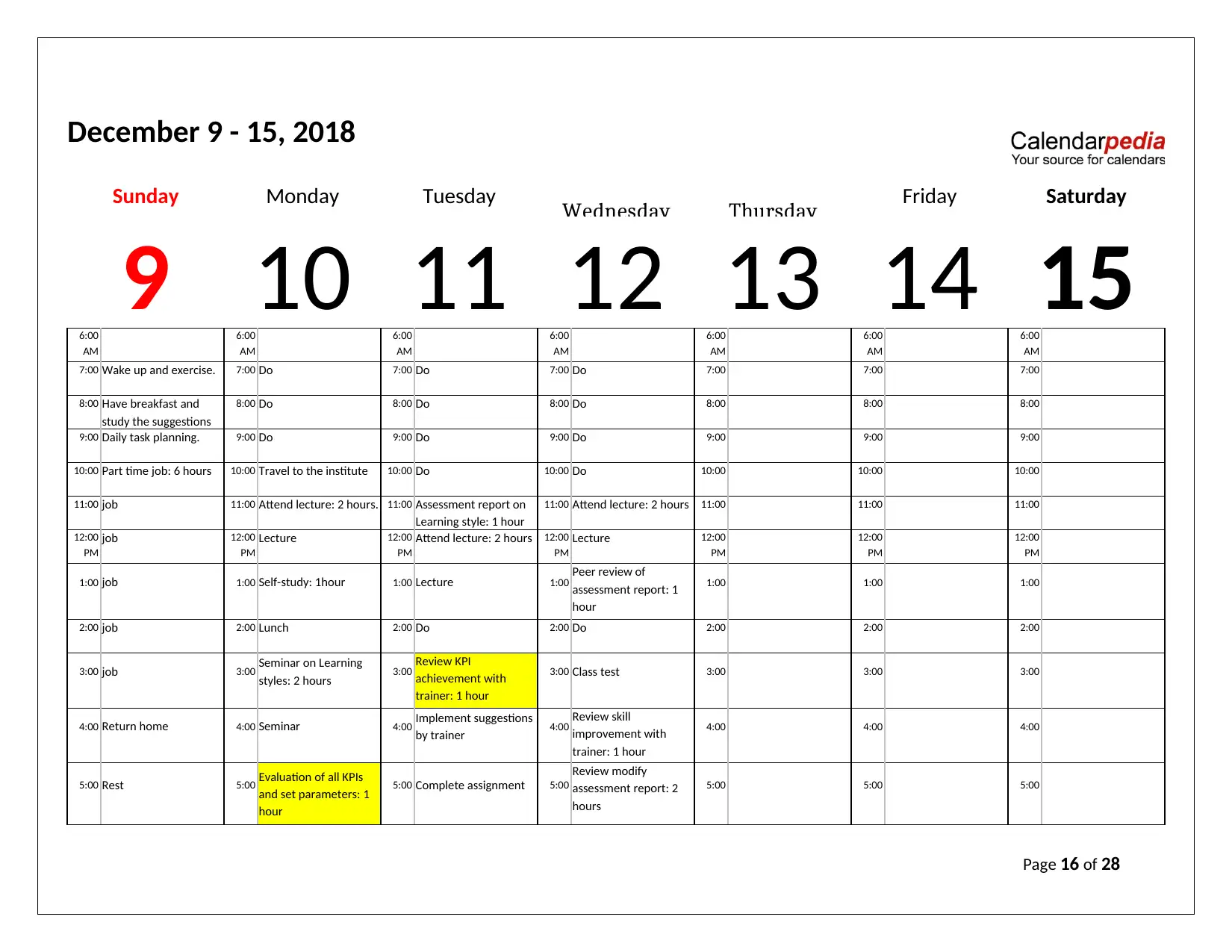
December 9 - 15, 2018
Sunday Monday Tuesday Wednesday Thursday Friday Saturday
9 10 11 12 13 14 156:00
AM
6:00
AM
6:00
AM
6:00
AM
6:00
AM
6:00
AM
6:00
AM
7:00 Wake up and exercise. 7:00 Do 7:00 Do 7:00 Do 7:00 7:00 7:00
8:00 Have breakfast and
study the suggestions
by the trainer.
8:00 Do 8:00 Do 8:00 Do 8:00 8:00 8:00
9:00 Daily task planning. 9:00 Do 9:00 Do 9:00 Do 9:00 9:00 9:00
10:00 Part time job: 6 hours 10:00 Travel to the institute 10:00 Do 10:00 Do 10:00 10:00 10:00
11:00 job 11:00 Attend lecture: 2 hours. 11:00 Assessment report on
Learning style: 1 hour
11:00 Attend lecture: 2 hours 11:00 11:00 11:00
12:00
PM
job 12:00
PM
Lecture 12:00
PM
Attend lecture: 2 hours 12:00
PM
Lecture 12:00
PM
12:00
PM
12:00
PM
1:00 job 1:00 Self-study: 1hour 1:00 Lecture 1:00 Peer review of
assessment report: 1
hour
1:00 1:00 1:00
2:00 job 2:00 Lunch 2:00 Do 2:00 Do 2:00 2:00 2:00
3:00 job 3:00 Seminar on Learning
styles: 2 hours 3:00 Review KPI
achievement with
trainer: 1 hour
3:00 Class test 3:00 3:00 3:00
4:00 Return home 4:00 Seminar 4:00 Implement suggestions
by trainer 4:00 Review skill
improvement with
trainer: 1 hour
4:00 4:00 4:00
5:00 Rest 5:00 Evaluation of all KPIs
and set parameters: 1
hour
5:00 Complete assignment 5:00
Review modify
assessment report: 2
hours
5:00 5:00 5:00
Page 16 of 28
Sunday Monday Tuesday Wednesday Thursday Friday Saturday
9 10 11 12 13 14 156:00
AM
6:00
AM
6:00
AM
6:00
AM
6:00
AM
6:00
AM
6:00
AM
7:00 Wake up and exercise. 7:00 Do 7:00 Do 7:00 Do 7:00 7:00 7:00
8:00 Have breakfast and
study the suggestions
by the trainer.
8:00 Do 8:00 Do 8:00 Do 8:00 8:00 8:00
9:00 Daily task planning. 9:00 Do 9:00 Do 9:00 Do 9:00 9:00 9:00
10:00 Part time job: 6 hours 10:00 Travel to the institute 10:00 Do 10:00 Do 10:00 10:00 10:00
11:00 job 11:00 Attend lecture: 2 hours. 11:00 Assessment report on
Learning style: 1 hour
11:00 Attend lecture: 2 hours 11:00 11:00 11:00
12:00
PM
job 12:00
PM
Lecture 12:00
PM
Attend lecture: 2 hours 12:00
PM
Lecture 12:00
PM
12:00
PM
12:00
PM
1:00 job 1:00 Self-study: 1hour 1:00 Lecture 1:00 Peer review of
assessment report: 1
hour
1:00 1:00 1:00
2:00 job 2:00 Lunch 2:00 Do 2:00 Do 2:00 2:00 2:00
3:00 job 3:00 Seminar on Learning
styles: 2 hours 3:00 Review KPI
achievement with
trainer: 1 hour
3:00 Class test 3:00 3:00 3:00
4:00 Return home 4:00 Seminar 4:00 Implement suggestions
by trainer 4:00 Review skill
improvement with
trainer: 1 hour
4:00 4:00 4:00
5:00 Rest 5:00 Evaluation of all KPIs
and set parameters: 1
hour
5:00 Complete assignment 5:00
Review modify
assessment report: 2
hours
5:00 5:00 5:00
Page 16 of 28
Secure Best Marks with AI Grader
Need help grading? Try our AI Grader for instant feedback on your assignments.
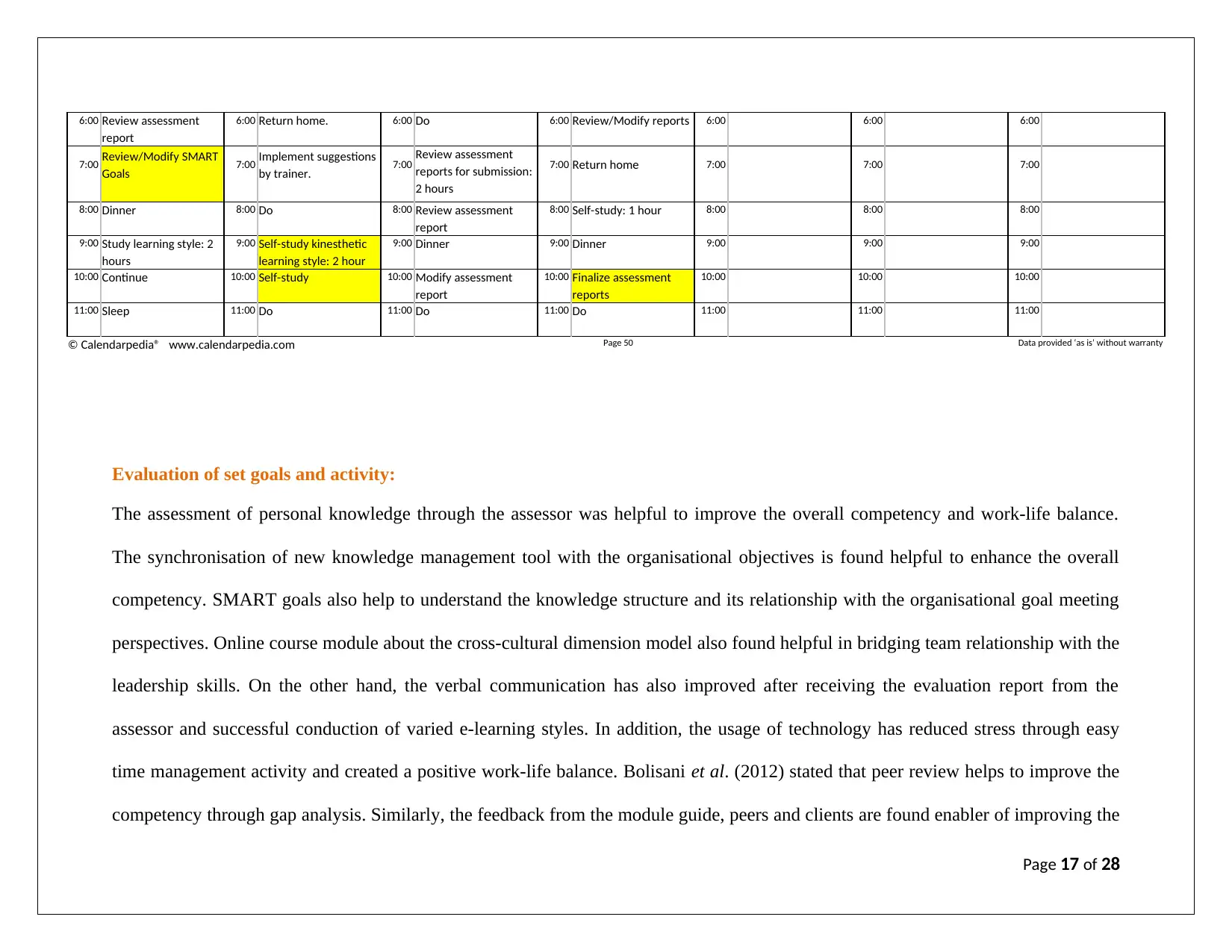
6:00 Review assessment
report
6:00 Return home. 6:00 Do 6:00 Review/Modify reports 6:00 6:00 6:00
7:00 Review/Modify SMART
Goals 7:00 Implement suggestions
by trainer. 7:00 Review assessment
reports for submission:
2 hours
7:00 Return home 7:00 7:00 7:00
8:00 Dinner 8:00 Do 8:00 Review assessment
report
8:00 Self-study: 1 hour 8:00 8:00 8:00
9:00 Study learning style: 2
hours
9:00 Self-study kinesthetic
learning style: 2 hour
9:00 Dinner 9:00 Dinner 9:00 9:00 9:00
10:00 Continue 10:00 Self-study 10:00 Modify assessment
report
10:00 Finalize assessment
reports
10:00 10:00 10:00
11:00 Sleep 11:00 Do 11:00 Do 11:00 Do 11:00 11:00 11:00
© Calendarpedia® www.calendarpedia.com Page 50 Data provided ‘as is’ without warranty
Evaluation of set goals and activity:
The assessment of personal knowledge through the assessor was helpful to improve the overall competency and work-life balance.
The synchronisation of new knowledge management tool with the organisational objectives is found helpful to enhance the overall
competency. SMART goals also help to understand the knowledge structure and its relationship with the organisational goal meeting
perspectives. Online course module about the cross-cultural dimension model also found helpful in bridging team relationship with the
leadership skills. On the other hand, the verbal communication has also improved after receiving the evaluation report from the
assessor and successful conduction of varied e-learning styles. In addition, the usage of technology has reduced stress through easy
time management activity and created a positive work-life balance. Bolisani et al. (2012) stated that peer review helps to improve the
competency through gap analysis. Similarly, the feedback from the module guide, peers and clients are found enabler of improving the
Page 17 of 28
report
6:00 Return home. 6:00 Do 6:00 Review/Modify reports 6:00 6:00 6:00
7:00 Review/Modify SMART
Goals 7:00 Implement suggestions
by trainer. 7:00 Review assessment
reports for submission:
2 hours
7:00 Return home 7:00 7:00 7:00
8:00 Dinner 8:00 Do 8:00 Review assessment
report
8:00 Self-study: 1 hour 8:00 8:00 8:00
9:00 Study learning style: 2
hours
9:00 Self-study kinesthetic
learning style: 2 hour
9:00 Dinner 9:00 Dinner 9:00 9:00 9:00
10:00 Continue 10:00 Self-study 10:00 Modify assessment
report
10:00 Finalize assessment
reports
10:00 10:00 10:00
11:00 Sleep 11:00 Do 11:00 Do 11:00 Do 11:00 11:00 11:00
© Calendarpedia® www.calendarpedia.com Page 50 Data provided ‘as is’ without warranty
Evaluation of set goals and activity:
The assessment of personal knowledge through the assessor was helpful to improve the overall competency and work-life balance.
The synchronisation of new knowledge management tool with the organisational objectives is found helpful to enhance the overall
competency. SMART goals also help to understand the knowledge structure and its relationship with the organisational goal meeting
perspectives. Online course module about the cross-cultural dimension model also found helpful in bridging team relationship with the
leadership skills. On the other hand, the verbal communication has also improved after receiving the evaluation report from the
assessor and successful conduction of varied e-learning styles. In addition, the usage of technology has reduced stress through easy
time management activity and created a positive work-life balance. Bolisani et al. (2012) stated that peer review helps to improve the
competency through gap analysis. Similarly, the feedback from the module guide, peers and clients are found enabler of improving the
Page 17 of 28
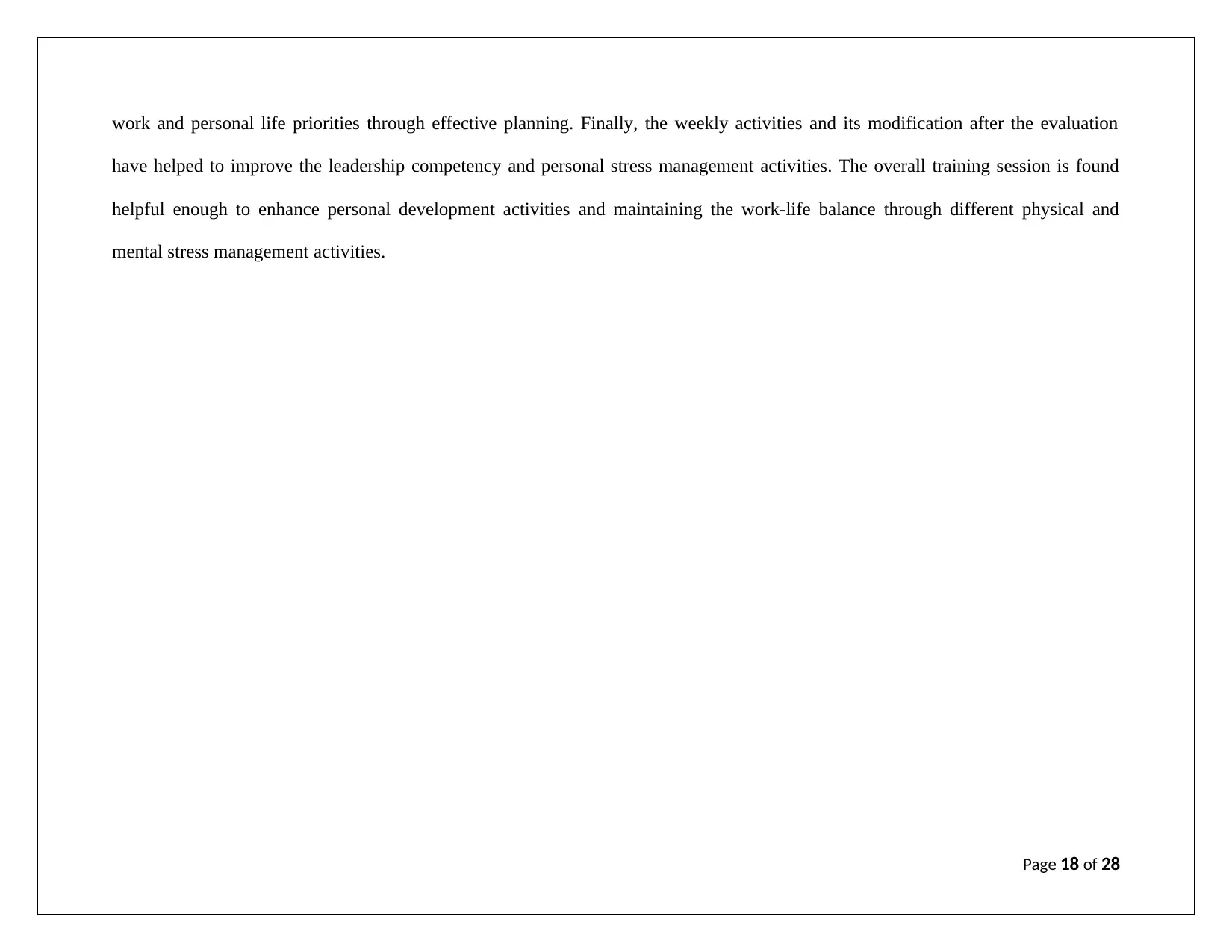
work and personal life priorities through effective planning. Finally, the weekly activities and its modification after the evaluation
have helped to improve the leadership competency and personal stress management activities. The overall training session is found
helpful enough to enhance personal development activities and maintaining the work-life balance through different physical and
mental stress management activities.
Page 18 of 28
have helped to improve the leadership competency and personal stress management activities. The overall training session is found
helpful enough to enhance personal development activities and maintaining the work-life balance through different physical and
mental stress management activities.
Page 18 of 28
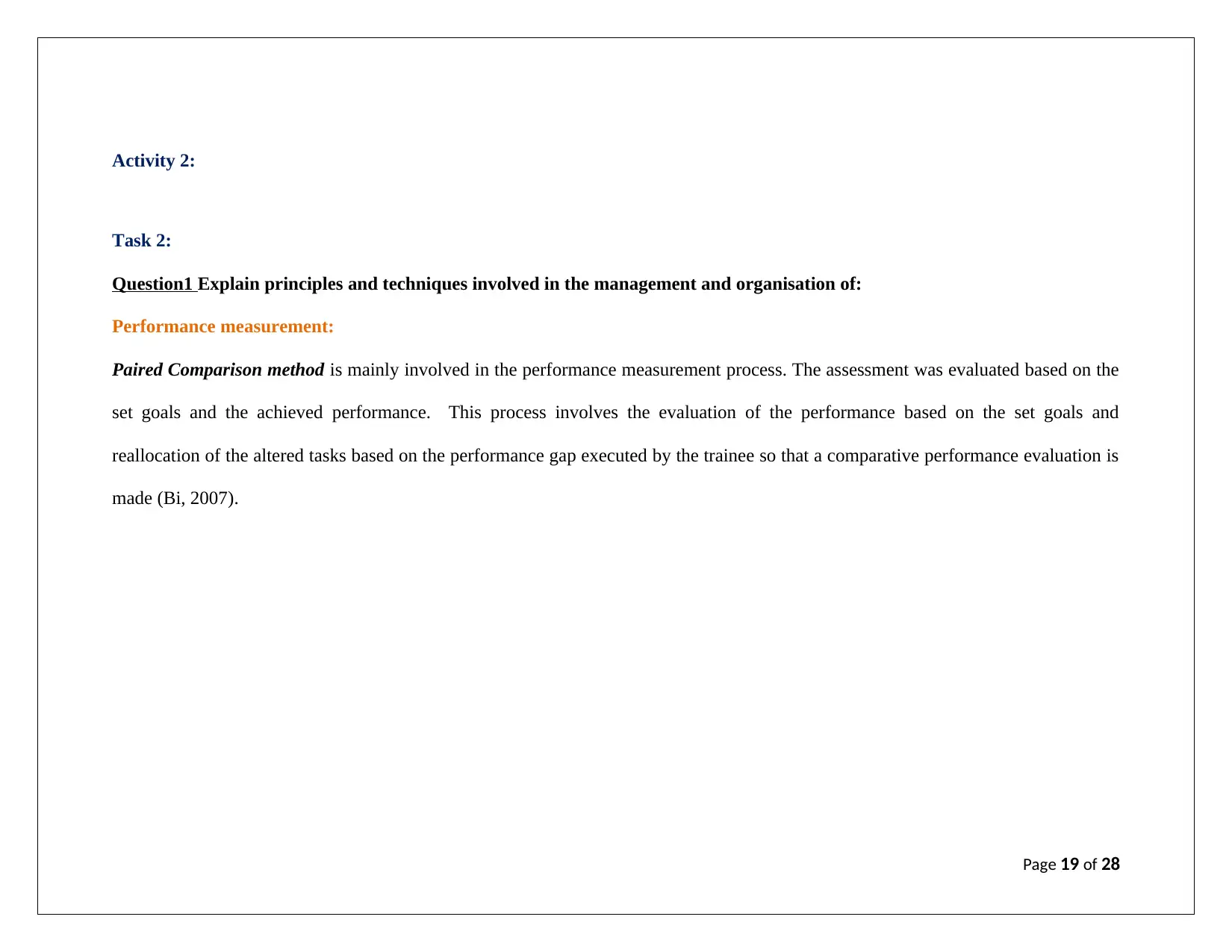
Activity 2:
Task 2:
Question1 Explain principles and techniques involved in the management and organisation of:
Performance measurement:
Paired Comparison method is mainly involved in the performance measurement process. The assessment was evaluated based on the
set goals and the achieved performance. This process involves the evaluation of the performance based on the set goals and
reallocation of the altered tasks based on the performance gap executed by the trainee so that a comparative performance evaluation is
made (Bi, 2007).
Page 19 of 28
Task 2:
Question1 Explain principles and techniques involved in the management and organisation of:
Performance measurement:
Paired Comparison method is mainly involved in the performance measurement process. The assessment was evaluated based on the
set goals and the achieved performance. This process involves the evaluation of the performance based on the set goals and
reallocation of the altered tasks based on the performance gap executed by the trainee so that a comparative performance evaluation is
made (Bi, 2007).
Page 19 of 28
Paraphrase This Document
Need a fresh take? Get an instant paraphrase of this document with our AI Paraphraser
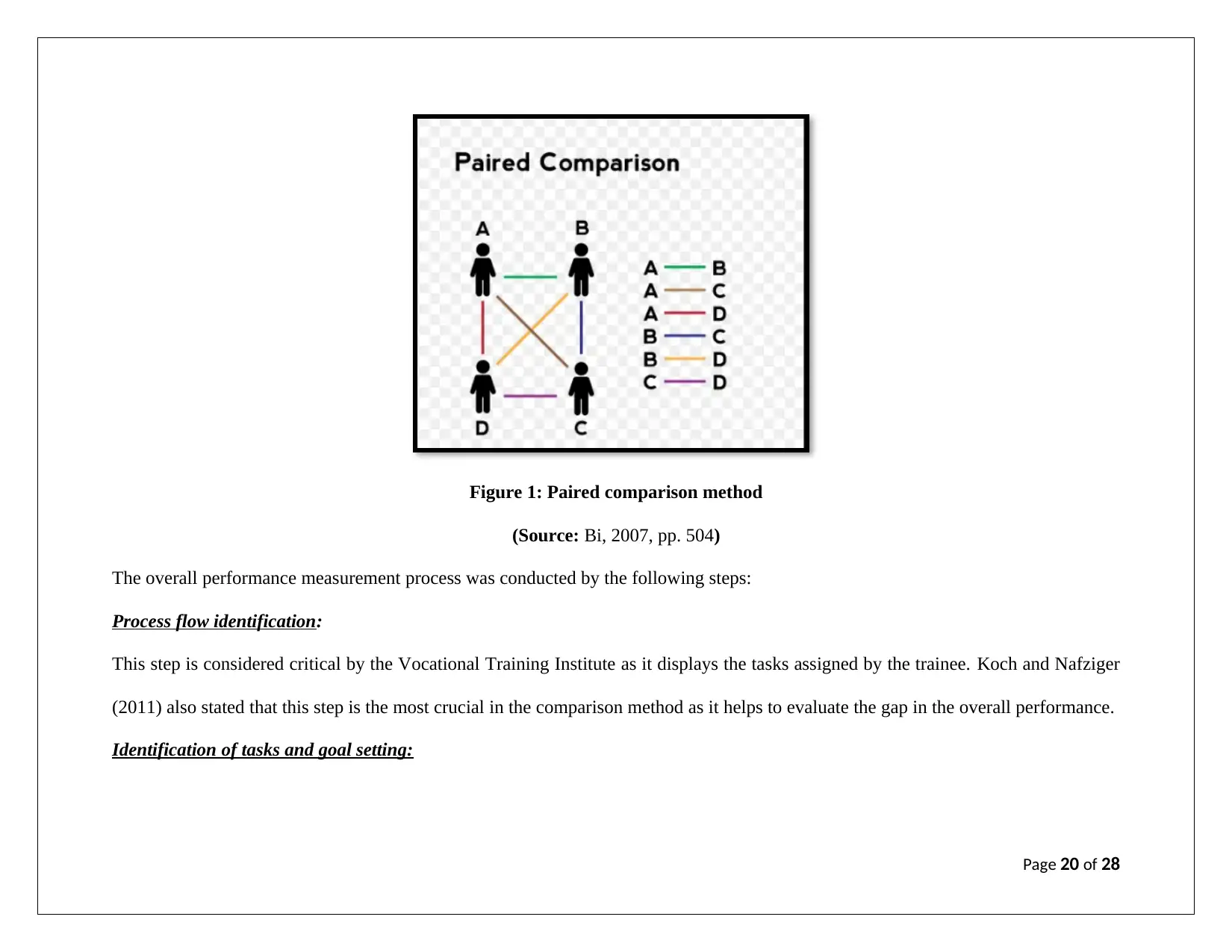
Figure 1: Paired comparison method
(Source: Bi, 2007, pp. 504)
The overall performance measurement process was conducted by the following steps:
Process flow identification:
This step is considered critical by the Vocational Training Institute as it displays the tasks assigned by the trainee. Koch and Nafziger
(2011) also stated that this step is the most crucial in the comparison method as it helps to evaluate the gap in the overall performance.
Identification of tasks and goal setting:
Page 20 of 28
(Source: Bi, 2007, pp. 504)
The overall performance measurement process was conducted by the following steps:
Process flow identification:
This step is considered critical by the Vocational Training Institute as it displays the tasks assigned by the trainee. Koch and Nafziger
(2011) also stated that this step is the most crucial in the comparison method as it helps to evaluate the gap in the overall performance.
Identification of tasks and goal setting:
Page 20 of 28
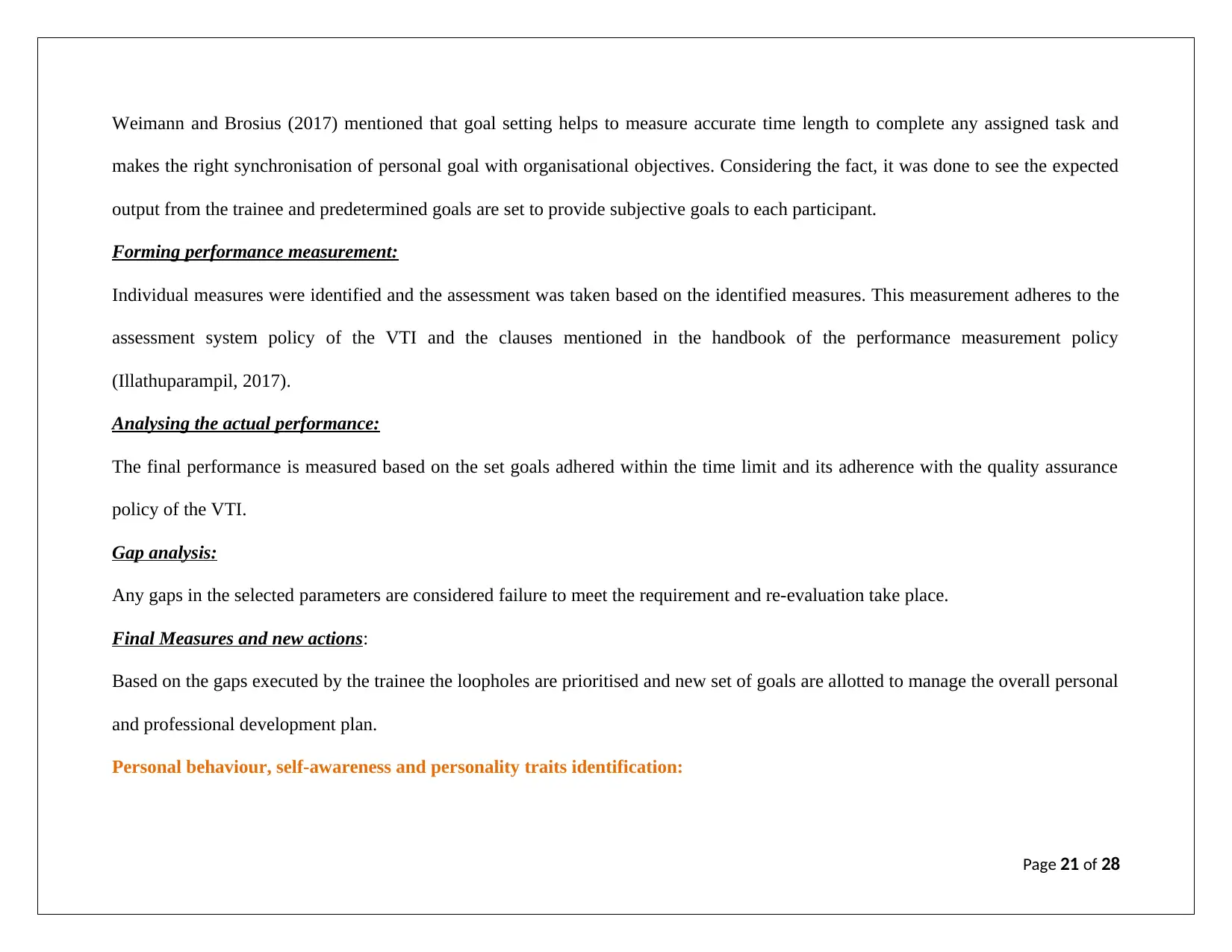
Weimann and Brosius (2017) mentioned that goal setting helps to measure accurate time length to complete any assigned task and
makes the right synchronisation of personal goal with organisational objectives. Considering the fact, it was done to see the expected
output from the trainee and predetermined goals are set to provide subjective goals to each participant.
Forming performance measurement:
Individual measures were identified and the assessment was taken based on the identified measures. This measurement adheres to the
assessment system policy of the VTI and the clauses mentioned in the handbook of the performance measurement policy
(Illathuparampil, 2017).
Analysing the actual performance:
The final performance is measured based on the set goals adhered within the time limit and its adherence with the quality assurance
policy of the VTI.
Gap analysis:
Any gaps in the selected parameters are considered failure to meet the requirement and re-evaluation take place.
Final Measures and new actions:
Based on the gaps executed by the trainee the loopholes are prioritised and new set of goals are allotted to manage the overall personal
and professional development plan.
Personal behaviour, self-awareness and personality traits identification:
Page 21 of 28
makes the right synchronisation of personal goal with organisational objectives. Considering the fact, it was done to see the expected
output from the trainee and predetermined goals are set to provide subjective goals to each participant.
Forming performance measurement:
Individual measures were identified and the assessment was taken based on the identified measures. This measurement adheres to the
assessment system policy of the VTI and the clauses mentioned in the handbook of the performance measurement policy
(Illathuparampil, 2017).
Analysing the actual performance:
The final performance is measured based on the set goals adhered within the time limit and its adherence with the quality assurance
policy of the VTI.
Gap analysis:
Any gaps in the selected parameters are considered failure to meet the requirement and re-evaluation take place.
Final Measures and new actions:
Based on the gaps executed by the trainee the loopholes are prioritised and new set of goals are allotted to manage the overall personal
and professional development plan.
Personal behaviour, self-awareness and personality traits identification:
Page 21 of 28
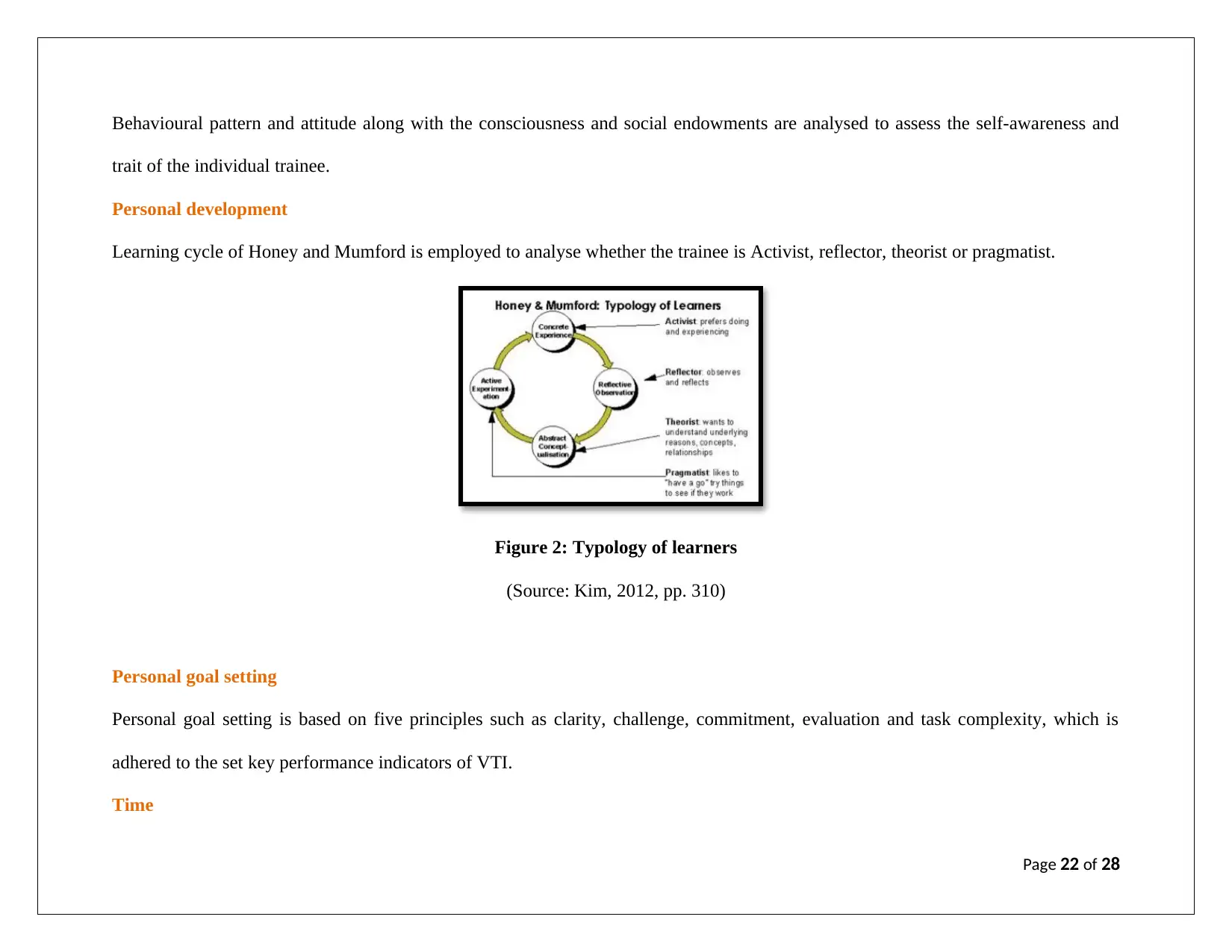
Behavioural pattern and attitude along with the consciousness and social endowments are analysed to assess the self-awareness and
trait of the individual trainee.
Personal development
Learning cycle of Honey and Mumford is employed to analyse whether the trainee is Activist, reflector, theorist or pragmatist.
Figure 2: Typology of learners
(Source: Kim, 2012, pp. 310)
Personal goal setting
Personal goal setting is based on five principles such as clarity, challenge, commitment, evaluation and task complexity, which is
adhered to the set key performance indicators of VTI.
Time
Page 22 of 28
trait of the individual trainee.
Personal development
Learning cycle of Honey and Mumford is employed to analyse whether the trainee is Activist, reflector, theorist or pragmatist.
Figure 2: Typology of learners
(Source: Kim, 2012, pp. 310)
Personal goal setting
Personal goal setting is based on five principles such as clarity, challenge, commitment, evaluation and task complexity, which is
adhered to the set key performance indicators of VTI.
Time
Page 22 of 28
Secure Best Marks with AI Grader
Need help grading? Try our AI Grader for instant feedback on your assignments.
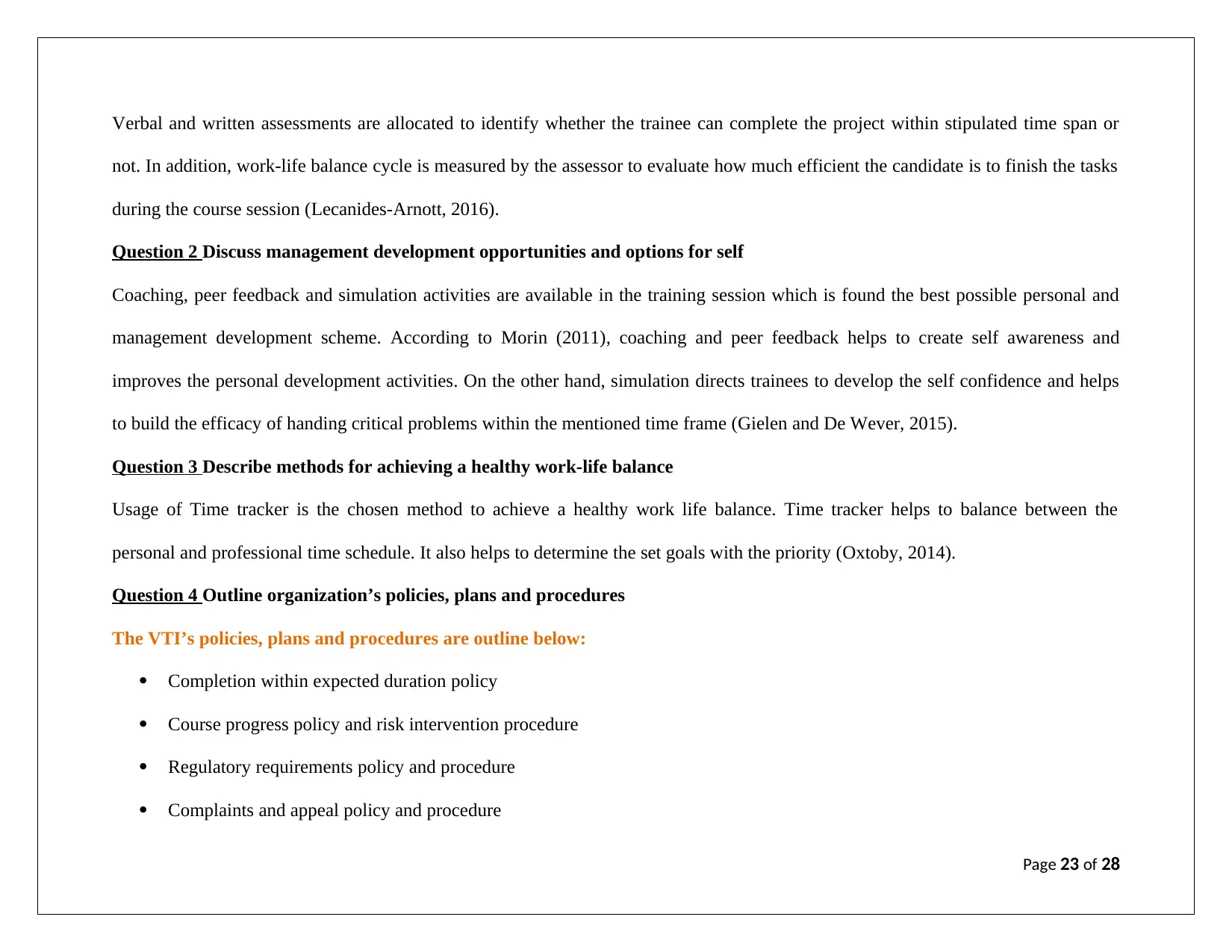
Verbal and written assessments are allocated to identify whether the trainee can complete the project within stipulated time span or
not. In addition, work-life balance cycle is measured by the assessor to evaluate how much efficient the candidate is to finish the tasks
during the course session (Lecanides-Arnott, 2016).
Question 2 Discuss management development opportunities and options for self
Coaching, peer feedback and simulation activities are available in the training session which is found the best possible personal and
management development scheme. According to Morin (2011), coaching and peer feedback helps to create self awareness and
improves the personal development activities. On the other hand, simulation directs trainees to develop the self confidence and helps
to build the efficacy of handing critical problems within the mentioned time frame (Gielen and De Wever, 2015).
Question 3 Describe methods for achieving a healthy work-life balance
Usage of Time tracker is the chosen method to achieve a healthy work life balance. Time tracker helps to balance between the
personal and professional time schedule. It also helps to determine the set goals with the priority (Oxtoby, 2014).
Question 4 Outline organization’s policies, plans and procedures
The VTI’s policies, plans and procedures are outline below:
Completion within expected duration policy
Course progress policy and risk intervention procedure
Regulatory requirements policy and procedure
Complaints and appeal policy and procedure
Page 23 of 28
not. In addition, work-life balance cycle is measured by the assessor to evaluate how much efficient the candidate is to finish the tasks
during the course session (Lecanides-Arnott, 2016).
Question 2 Discuss management development opportunities and options for self
Coaching, peer feedback and simulation activities are available in the training session which is found the best possible personal and
management development scheme. According to Morin (2011), coaching and peer feedback helps to create self awareness and
improves the personal development activities. On the other hand, simulation directs trainees to develop the self confidence and helps
to build the efficacy of handing critical problems within the mentioned time frame (Gielen and De Wever, 2015).
Question 3 Describe methods for achieving a healthy work-life balance
Usage of Time tracker is the chosen method to achieve a healthy work life balance. Time tracker helps to balance between the
personal and professional time schedule. It also helps to determine the set goals with the priority (Oxtoby, 2014).
Question 4 Outline organization’s policies, plans and procedures
The VTI’s policies, plans and procedures are outline below:
Completion within expected duration policy
Course progress policy and risk intervention procedure
Regulatory requirements policy and procedure
Complaints and appeal policy and procedure
Page 23 of 28
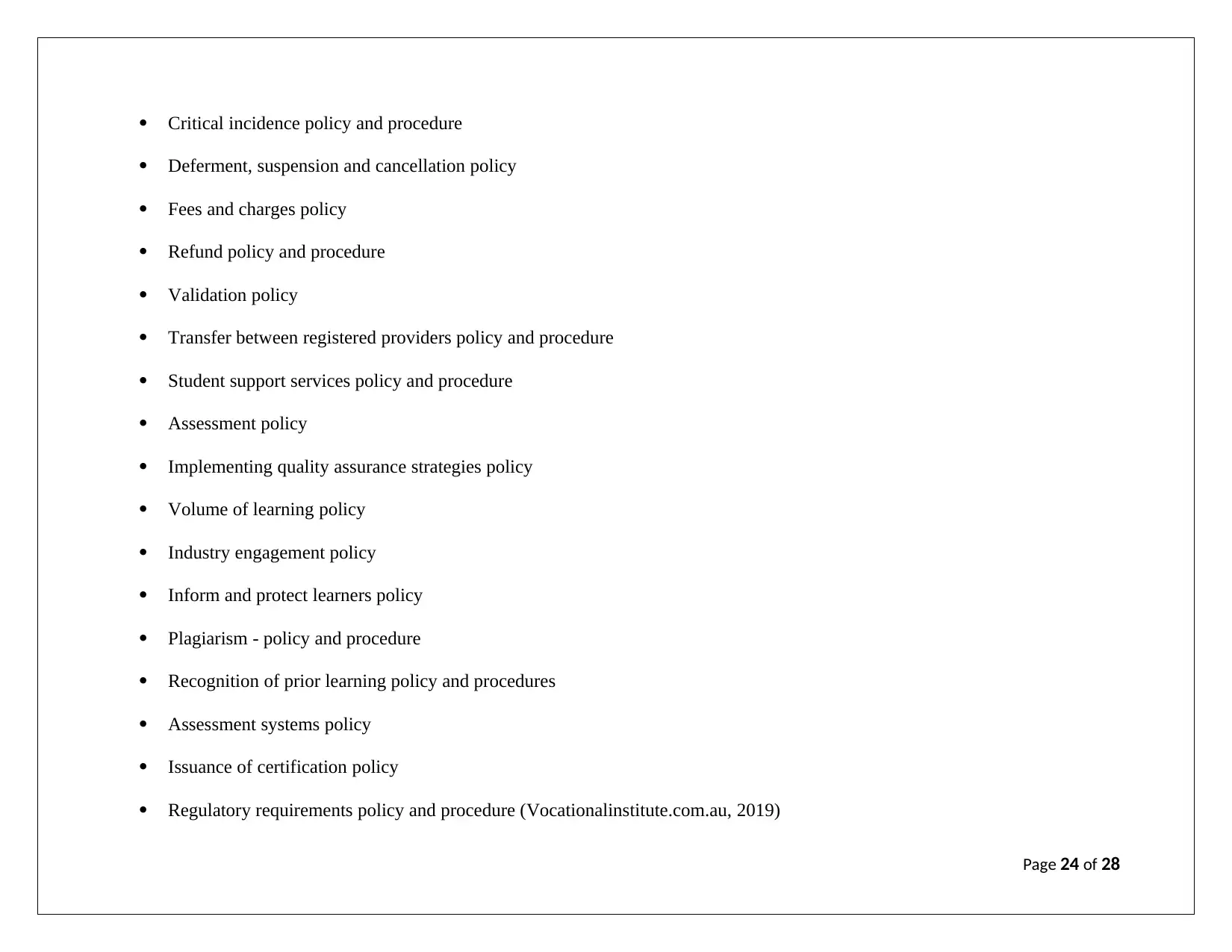
Critical incidence policy and procedure
Deferment, suspension and cancellation policy
Fees and charges policy
Refund policy and procedure
Validation policy
Transfer between registered providers policy and procedure
Student support services policy and procedure
Assessment policy
Implementing quality assurance strategies policy
Volume of learning policy
Industry engagement policy
Inform and protect learners policy
Plagiarism - policy and procedure
Recognition of prior learning policy and procedures
Assessment systems policy
Issuance of certification policy
Regulatory requirements policy and procedure (Vocationalinstitute.com.au, 2019)
Page 24 of 28
Deferment, suspension and cancellation policy
Fees and charges policy
Refund policy and procedure
Validation policy
Transfer between registered providers policy and procedure
Student support services policy and procedure
Assessment policy
Implementing quality assurance strategies policy
Volume of learning policy
Industry engagement policy
Inform and protect learners policy
Plagiarism - policy and procedure
Recognition of prior learning policy and procedures
Assessment systems policy
Issuance of certification policy
Regulatory requirements policy and procedure (Vocationalinstitute.com.au, 2019)
Page 24 of 28
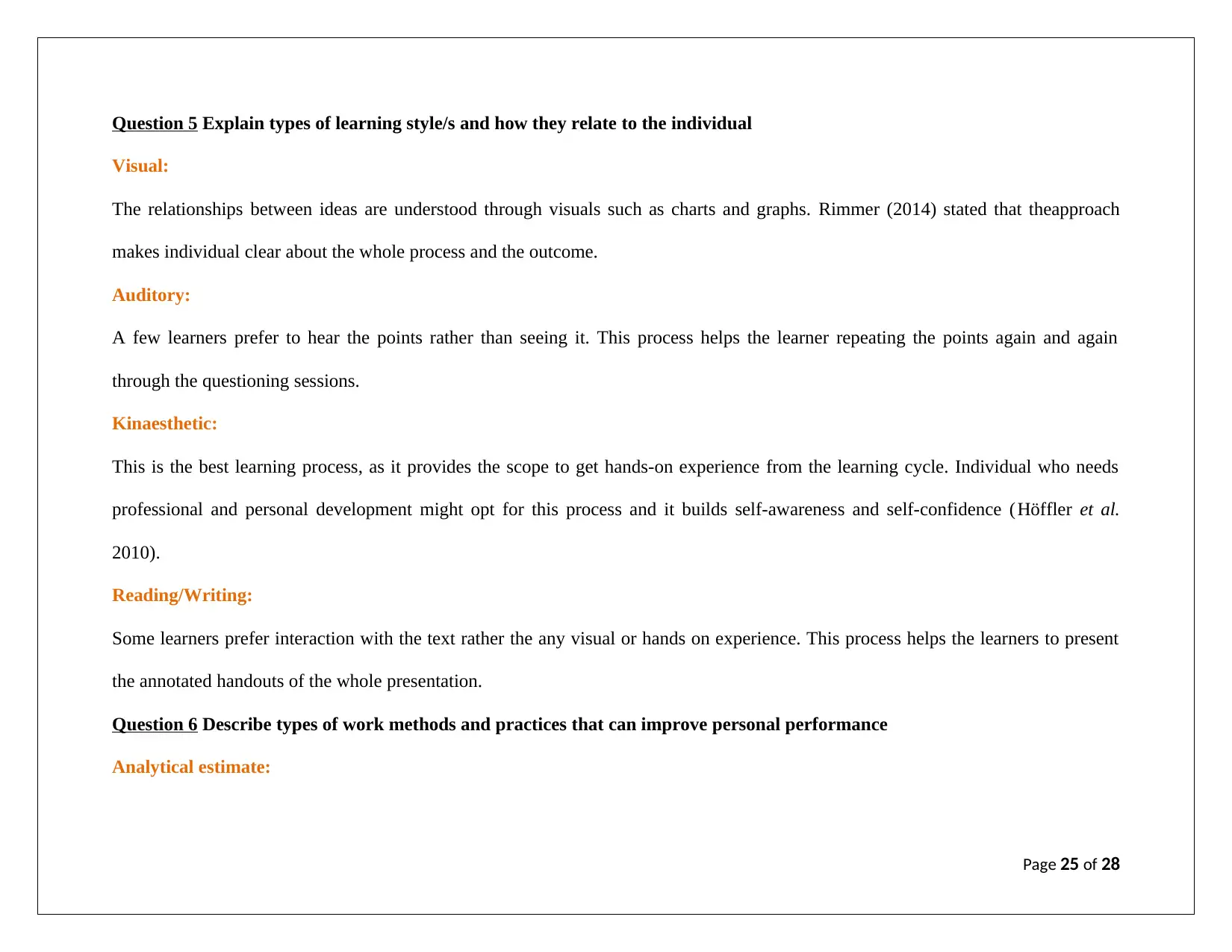
Question 5 Explain types of learning style/s and how they relate to the individual
Visual:
The relationships between ideas are understood through visuals such as charts and graphs. Rimmer (2014) stated that theapproach
makes individual clear about the whole process and the outcome.
Auditory:
A few learners prefer to hear the points rather than seeing it. This process helps the learner repeating the points again and again
through the questioning sessions.
Kinaesthetic:
This is the best learning process, as it provides the scope to get hands-on experience from the learning cycle. Individual who needs
professional and personal development might opt for this process and it builds self-awareness and self-confidence (Höffler et al.
2010).
Reading/Writing:
Some learners prefer interaction with the text rather the any visual or hands on experience. This process helps the learners to present
the annotated handouts of the whole presentation.
Question 6 Describe types of work methods and practices that can improve personal performance
Analytical estimate:
Page 25 of 28
Visual:
The relationships between ideas are understood through visuals such as charts and graphs. Rimmer (2014) stated that theapproach
makes individual clear about the whole process and the outcome.
Auditory:
A few learners prefer to hear the points rather than seeing it. This process helps the learner repeating the points again and again
through the questioning sessions.
Kinaesthetic:
This is the best learning process, as it provides the scope to get hands-on experience from the learning cycle. Individual who needs
professional and personal development might opt for this process and it builds self-awareness and self-confidence (Höffler et al.
2010).
Reading/Writing:
Some learners prefer interaction with the text rather the any visual or hands on experience. This process helps the learners to present
the annotated handouts of the whole presentation.
Question 6 Describe types of work methods and practices that can improve personal performance
Analytical estimate:
Page 25 of 28
Paraphrase This Document
Need a fresh take? Get an instant paraphrase of this document with our AI Paraphraser
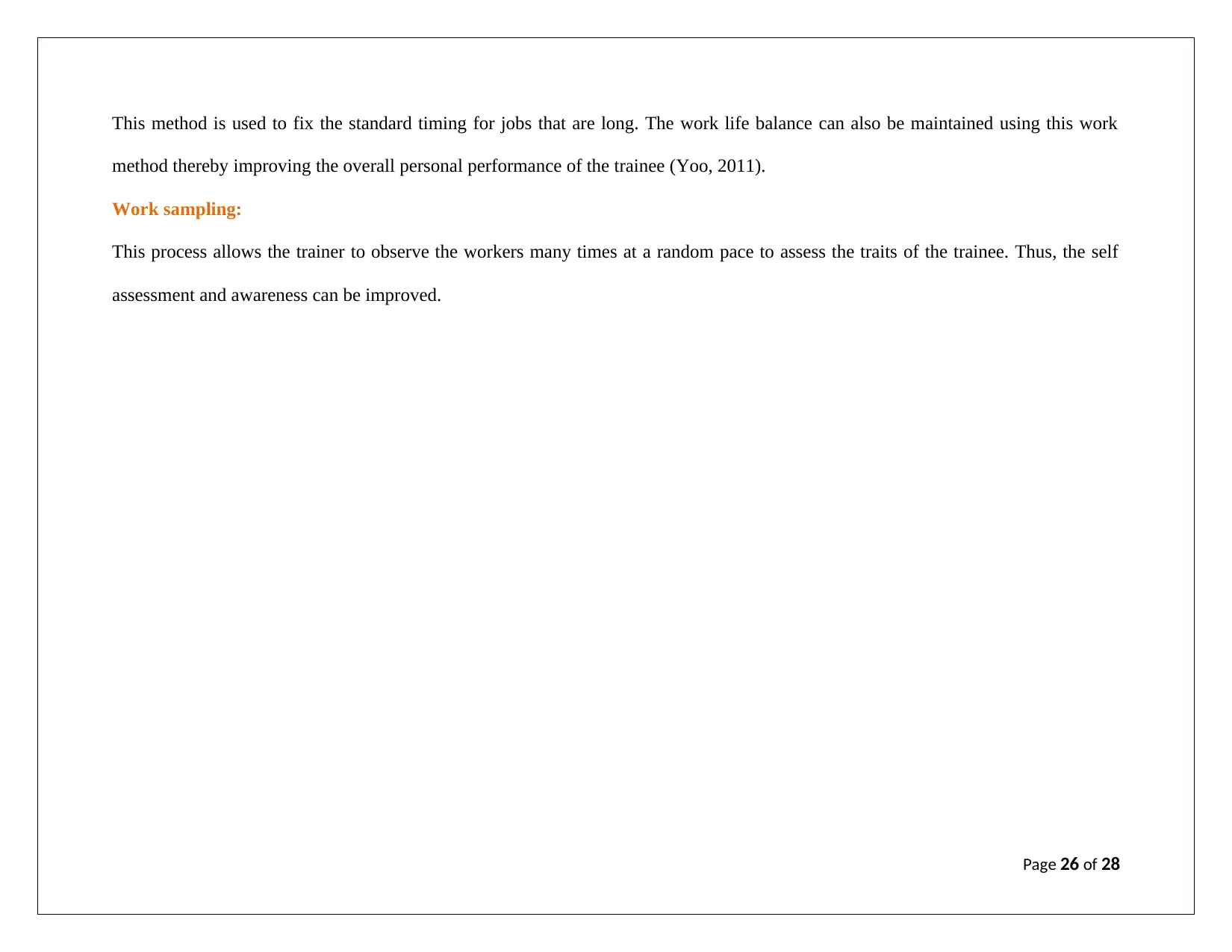
This method is used to fix the standard timing for jobs that are long. The work life balance can also be maintained using this work
method thereby improving the overall personal performance of the trainee (Yoo, 2011).
Work sampling:
This process allows the trainer to observe the workers many times at a random pace to assess the traits of the trainee. Thus, the self
assessment and awareness can be improved.
Page 26 of 28
method thereby improving the overall personal performance of the trainee (Yoo, 2011).
Work sampling:
This process allows the trainer to observe the workers many times at a random pace to assess the traits of the trainee. Thus, the self
assessment and awareness can be improved.
Page 26 of 28
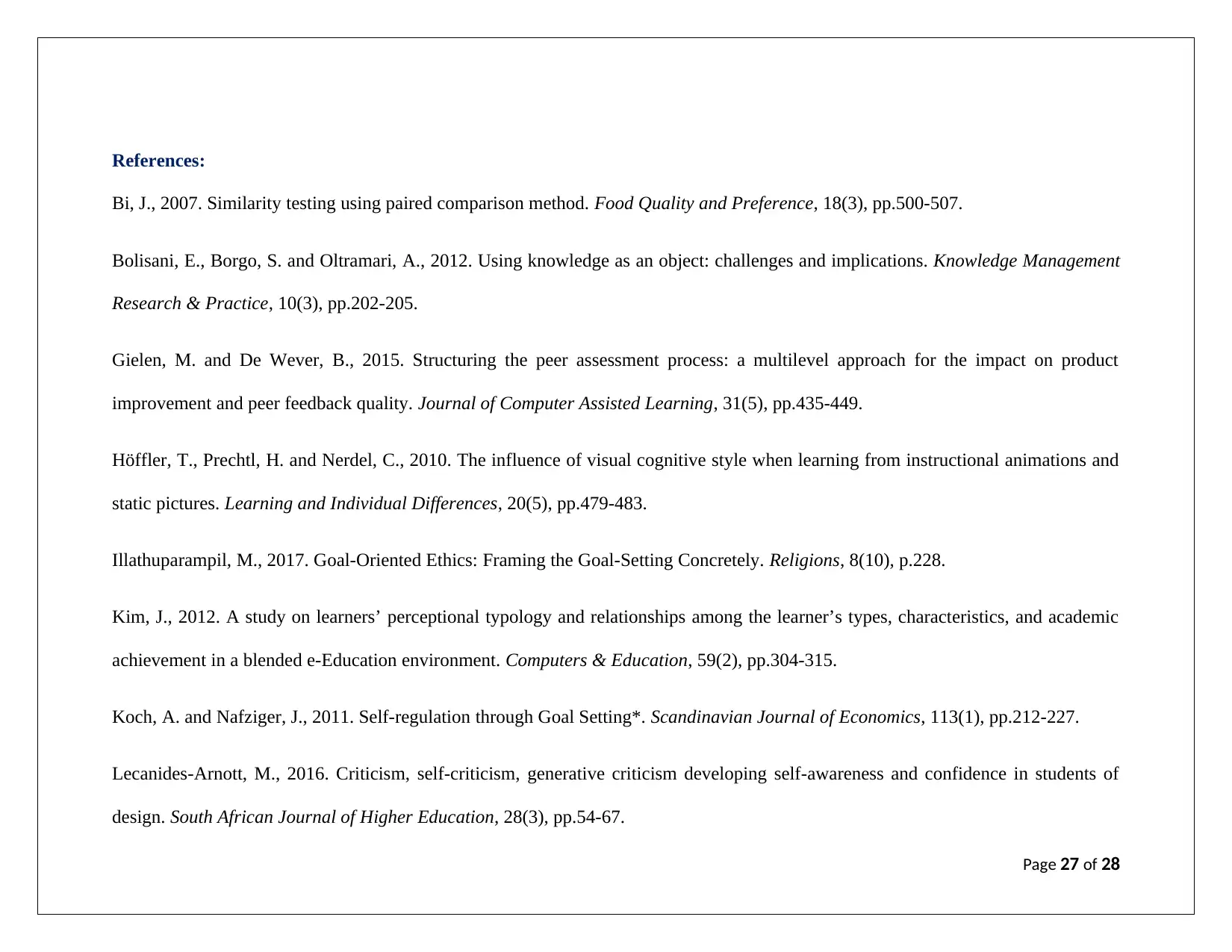
References:
Bi, J., 2007. Similarity testing using paired comparison method. Food Quality and Preference, 18(3), pp.500-507.
Bolisani, E., Borgo, S. and Oltramari, A., 2012. Using knowledge as an object: challenges and implications. Knowledge Management
Research & Practice, 10(3), pp.202-205.
Gielen, M. and De Wever, B., 2015. Structuring the peer assessment process: a multilevel approach for the impact on product
improvement and peer feedback quality. Journal of Computer Assisted Learning, 31(5), pp.435-449.
Höffler, T., Prechtl, H. and Nerdel, C., 2010. The influence of visual cognitive style when learning from instructional animations and
static pictures. Learning and Individual Differences, 20(5), pp.479-483.
Illathuparampil, M., 2017. Goal-Oriented Ethics: Framing the Goal-Setting Concretely. Religions, 8(10), p.228.
Kim, J., 2012. A study on learners’ perceptional typology and relationships among the learner’s types, characteristics, and academic
achievement in a blended e-Education environment. Computers & Education, 59(2), pp.304-315.
Koch, A. and Nafziger, J., 2011. Self-regulation through Goal Setting*. Scandinavian Journal of Economics, 113(1), pp.212-227.
Lecanides-Arnott, M., 2016. Criticism, self-criticism, generative criticism developing self-awareness and confidence in students of
design. South African Journal of Higher Education, 28(3), pp.54-67.
Page 27 of 28
Bi, J., 2007. Similarity testing using paired comparison method. Food Quality and Preference, 18(3), pp.500-507.
Bolisani, E., Borgo, S. and Oltramari, A., 2012. Using knowledge as an object: challenges and implications. Knowledge Management
Research & Practice, 10(3), pp.202-205.
Gielen, M. and De Wever, B., 2015. Structuring the peer assessment process: a multilevel approach for the impact on product
improvement and peer feedback quality. Journal of Computer Assisted Learning, 31(5), pp.435-449.
Höffler, T., Prechtl, H. and Nerdel, C., 2010. The influence of visual cognitive style when learning from instructional animations and
static pictures. Learning and Individual Differences, 20(5), pp.479-483.
Illathuparampil, M., 2017. Goal-Oriented Ethics: Framing the Goal-Setting Concretely. Religions, 8(10), p.228.
Kim, J., 2012. A study on learners’ perceptional typology and relationships among the learner’s types, characteristics, and academic
achievement in a blended e-Education environment. Computers & Education, 59(2), pp.304-315.
Koch, A. and Nafziger, J., 2011. Self-regulation through Goal Setting*. Scandinavian Journal of Economics, 113(1), pp.212-227.
Lecanides-Arnott, M., 2016. Criticism, self-criticism, generative criticism developing self-awareness and confidence in students of
design. South African Journal of Higher Education, 28(3), pp.54-67.
Page 27 of 28
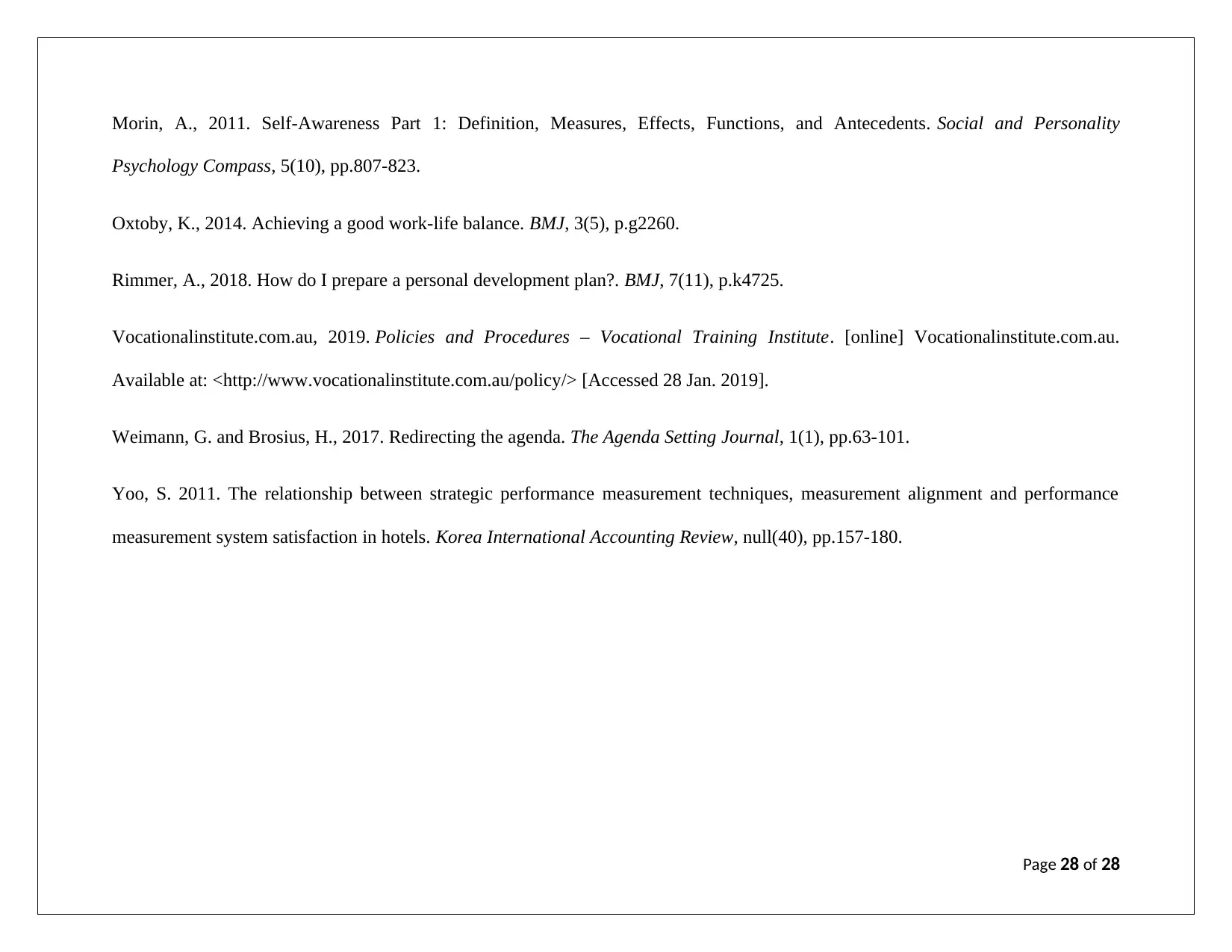
Morin, A., 2011. Self-Awareness Part 1: Definition, Measures, Effects, Functions, and Antecedents. Social and Personality
Psychology Compass, 5(10), pp.807-823.
Oxtoby, K., 2014. Achieving a good work-life balance. BMJ, 3(5), p.g2260.
Rimmer, A., 2018. How do I prepare a personal development plan?. BMJ, 7(11), p.k4725.
Vocationalinstitute.com.au, 2019. Policies and Procedures – Vocational Training Institute. [online] Vocationalinstitute.com.au.
Available at: <http://www.vocationalinstitute.com.au/policy/> [Accessed 28 Jan. 2019].
Weimann, G. and Brosius, H., 2017. Redirecting the agenda. The Agenda Setting Journal, 1(1), pp.63-101.
Yoo, S. 2011. The relationship between strategic performance measurement techniques, measurement alignment and performance
measurement system satisfaction in hotels. Korea International Accounting Review, null(40), pp.157-180.
Page 28 of 28
Psychology Compass, 5(10), pp.807-823.
Oxtoby, K., 2014. Achieving a good work-life balance. BMJ, 3(5), p.g2260.
Rimmer, A., 2018. How do I prepare a personal development plan?. BMJ, 7(11), p.k4725.
Vocationalinstitute.com.au, 2019. Policies and Procedures – Vocational Training Institute. [online] Vocationalinstitute.com.au.
Available at: <http://www.vocationalinstitute.com.au/policy/> [Accessed 28 Jan. 2019].
Weimann, G. and Brosius, H., 2017. Redirecting the agenda. The Agenda Setting Journal, 1(1), pp.63-101.
Yoo, S. 2011. The relationship between strategic performance measurement techniques, measurement alignment and performance
measurement system satisfaction in hotels. Korea International Accounting Review, null(40), pp.157-180.
Page 28 of 28
1 out of 28
Related Documents
Your All-in-One AI-Powered Toolkit for Academic Success.
+13062052269
info@desklib.com
Available 24*7 on WhatsApp / Email
![[object Object]](/_next/static/media/star-bottom.7253800d.svg)
Unlock your academic potential
© 2024 | Zucol Services PVT LTD | All rights reserved.




